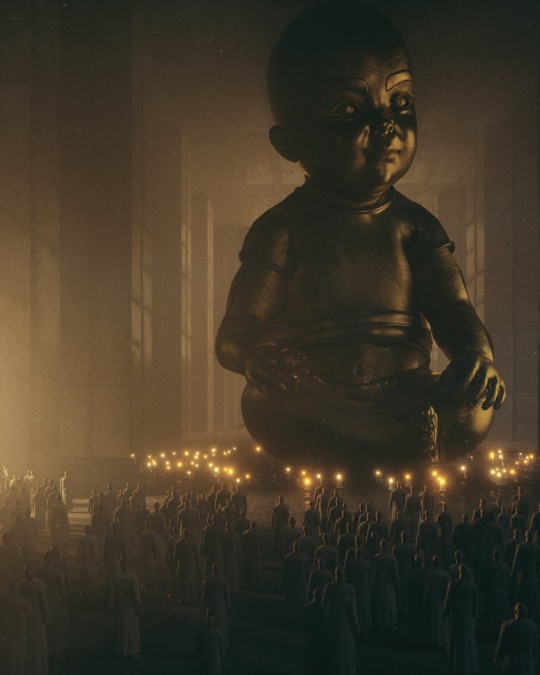Text
Bruzek's Flags
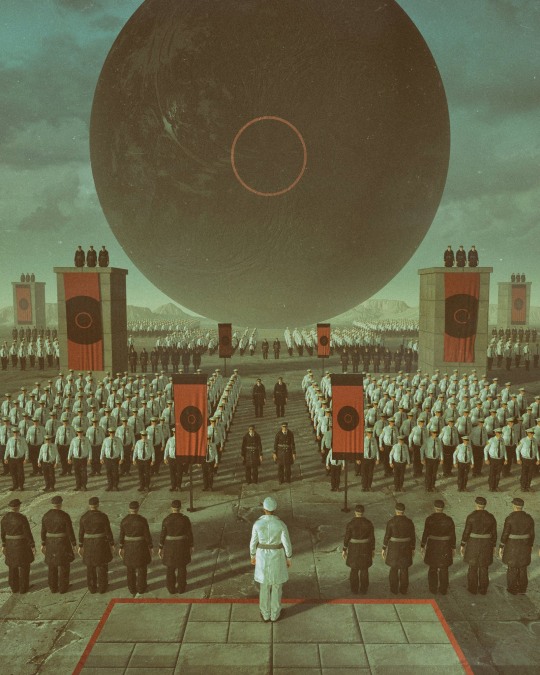
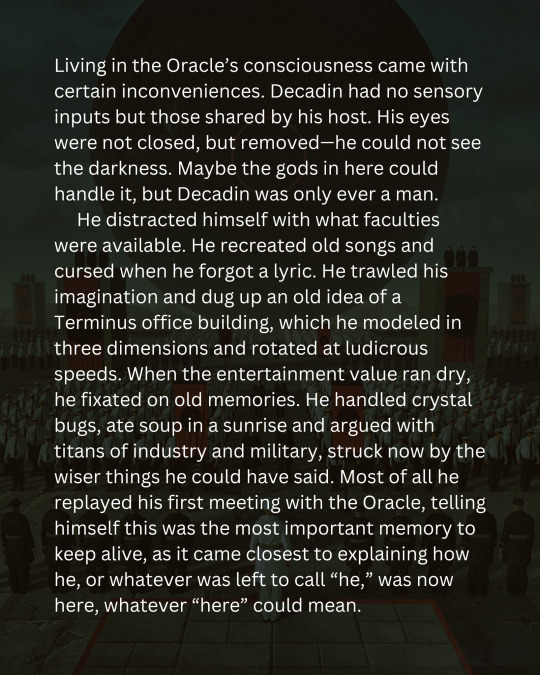

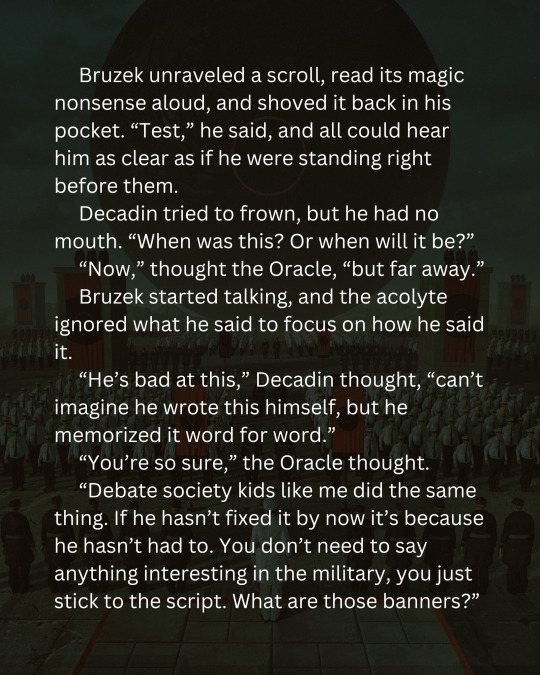
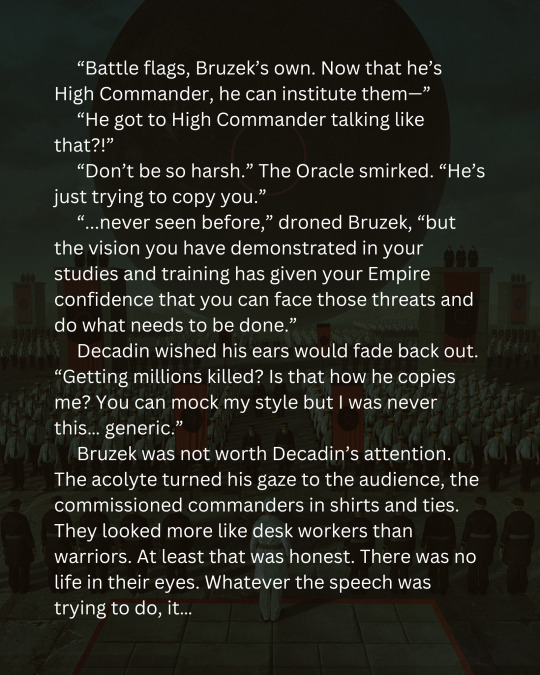

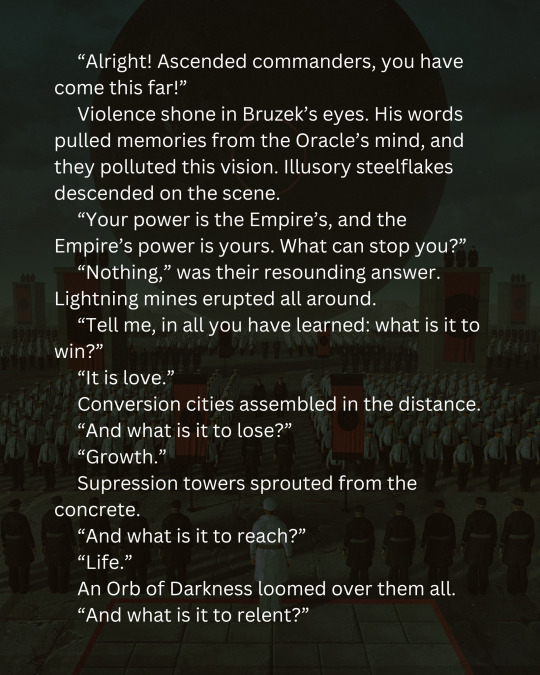
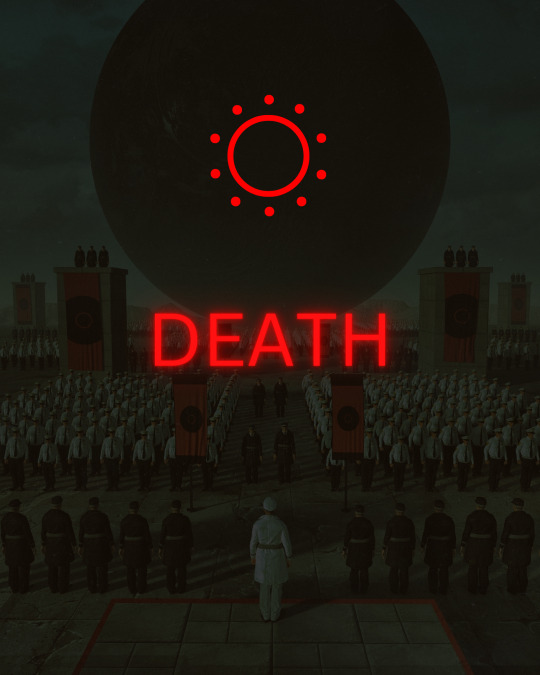
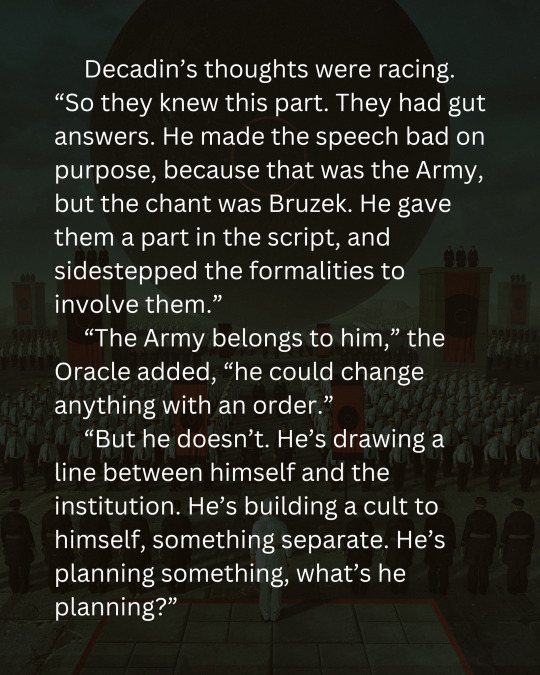

Living in the Oracle’s consciousness came with certain inconveniences. Decadin had no sensory inputs but those shared by his host. His eyes were not closed, but removed—he could not see the darkness. Maybe the gods in here could handle it, but Decadin was only ever a man.
He distracted himself with what faculties were available. He recreated old songs and cursed when he forgot a lyric. He trawled his imagination and dug up an old idea of a Terminus office building, which he modeled in three dimensions and rotated at ludicrous speeds. When the entertainment value ran dry, he fixated on old memories. He handled crystal bugs, ate soup in a sunrise and argued with titans of industry and military, struck now by the wiser things he could have said. Most of all he replayed his first meeting with the Oracle, telling himself this was the most important memory to keep alive, as it came closest to explaining how he, or whatever was left to call “he,” was now here, whatever “here” could mean.
The Oracle could see it all. “Anything to never think of Lhusel,” she thought, and it intruded on Decadin’s mind.
Decadin shoved that thought away.
“You think so much of one broken friendship, and not the families slain in your Empire’s name.”
He was not getting away from this. “Why would you even ask that? You know that bothers me too, but they weren’t part of me and my story like Lhusel was. That’s just how humans work.”
“Want to see something? You’ll go mad if I don’t feed you.”
“I’ll take anything.”
“Perhaps you can make better sense of this than I,” she said, and she poured a vision into Decadin’s mind. His eyes faded back in, and his ears and nose and skin. He was a ghost at a ceremony.
Bruzek unraveled a scroll, read its magic nonsense aloud, and shoved it back in his pocket. “Test,” he said, and all could hear him as clear as if he were standing right before them.
Decadin tried to frown, but he had no mouth. “When was this? Or when will it be?”
“Now,” thought the Oracle, “but far away.”
Bruzek started talking, and the acolyte ignored what he said to focus on how he said it.
“He’s bad at this,” Decadin thought, “can’t imagine he wrote this himself, but he memorized it word for word.”
“You’re so sure,” the Oracle thought.
“Debate society kids like me did the same thing. If he hasn’t fixed it by now it’s because he hasn’t had to. You don’t need to say anything interesting in the military, you just stick to the script. What are those banners?”
“Battle flags, Bruzek’s own. Now that he’s High Commander, he can institute them—”
“He got to High Commander talking like that?!”
“Don’t be so harsh.” The Oracle smirked. “He’s just trying to copy you.”
“...never seen before,” droned Bruzek, “but the vision you have demonstrated in your studies and training has given your Empire confidence that you can face those threats and do what needs to be done.”
Decadin wished his ears would fade back out. “Getting millions killed? Is that how he copies me? You can mock my style but I was never this… generic.”
Bruzek was not worth Decadin’s attention. The acolyte turned his gaze to the audience, the commissioned commanders in shirts and ties. They looked more like desk workers than warriors. At least that was honest. There was no life in their eyes. Whatever the speech was trying to do, it…
Decadin’s attention went back. “Maybe genericism is the point.”
He felt the Oracle’s interest pique. “Go on.”
“Ideas aren’t the reason he leads, but it’s not about following a script either, because then the words would matter. No, this isn’t about what he says to them. The point is, he’s at the front and they have to listen. This is a graduation speech?”
He felt the Oracle nod.
“So this is what the Army is about now. What learning is about, if you’re Ascended.”
Bruzek’s tone changed. “Okay, I could go on another five pages or we could skip to the important part. You’re adults, your time is valuable, you get it. What do you say?”
Decadin saw consciousness return to the soldiers’ eyes. They answered with mild laughter here and there, but no objections.
“Alright! Ascended commanders, you have come this far!”
Violence shone in Bruzek’s eyes. His words pulled memories from the Oracle’s mind, and they polluted this vision. Illusory steelflakes descended on the scene.
“Your power is the Empire’s, and the Empire’s power is yours. What can stop you?”
“Nothing,” was their resounding answer. Lightning mines erupted all around.
“Tell me, in all you have learned: what is it to win?”
“It is love.”
Conversion cities assembled in the distance.
“And what is it to lose?”
“Growth.”
Suppression towers sprouted from the concrete.
“And what is it to reach?”
“Life.”
An Orb of Darkness loomed over them all.
“And what is it to relent?”
“DEATH.”
Decadin’s thoughts were racing. “So they knew this part. They had gut answers. He made the speech bad on purpose, because that was the Army, but the chant was Bruzek. He gave them a part in the script, and sidestepped the formalities to involve them.”
“The Army belongs to him,” the Oracle added, “he could change anything with an order.”
“But he doesn’t. He’s drawing a line between himself and the institution. He’s building a cult to himself, something separate. He’s planning something, what’s he planning?”
“Yes, you are right,” thought the Oracle, “thank you.”
Decadin’s eyes began to fade, and ears and nose and skin, as though the Orb of Darkness were consuming it all.
“Oracle, what’s he planning?” He asked again, but she had sectioned him off again, cast him back to his songs, buildings and obsessions. He pouted and thought of all those men, the true killers in all the Conquests, petty tyrants with computers and annual reviews, Bruzeks in the making. Decadin dreamed up a bomb that could’ve killed them all where they stood, and rotated it at ludicrous speeds.
———
Yaldev is a sci-fantasy worldbuilding project by Ulysses Maurer, with art by Beeple. By looking at narratives, stylized loredumps, bad poetry and little details, we'll witness the story of a planet filled with magical power, the nation which tried to conquer it, this empire’s dramatic collapse and the new world which emerged in its wake. Along the way we'll meet the characters who live here, and we'll explore questions about nationalism, rationalism, the natural world and the quest to master it. For all stories in chronological order, check out the pinned posts at r/Yaldev!
#beeple#fantasy#scifi#worldbuilding#writing#everyday#short story#surreal#dystopia#dystopian#dystopian fiction#science fiction#science fantasy#sci fantasy#sci-fantasy#scifantasy#sf#sff#worldbuild#worldbuilder#worldbuilders#magic#d&d#dnd#canadian writers#escapism#lore#amwriting
4 notes
·
View notes
Text
Empty City

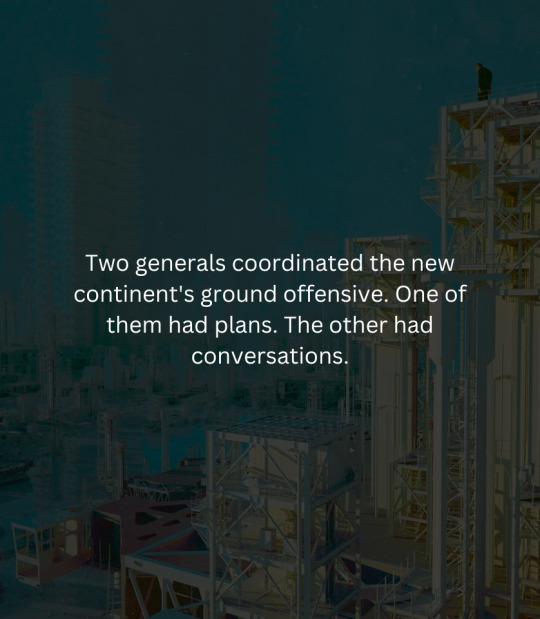
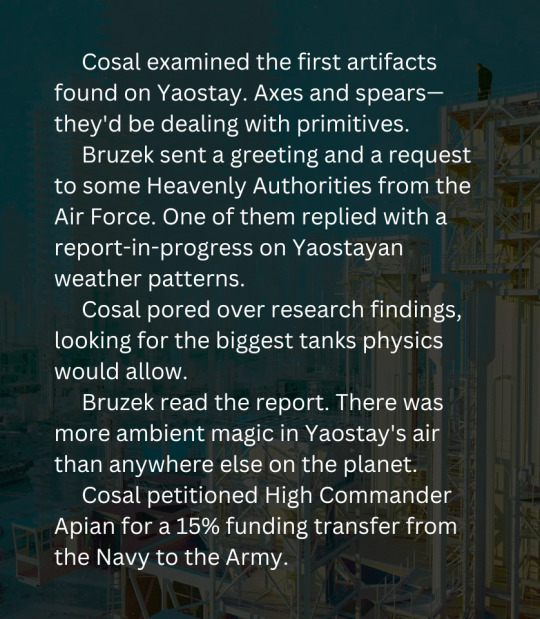
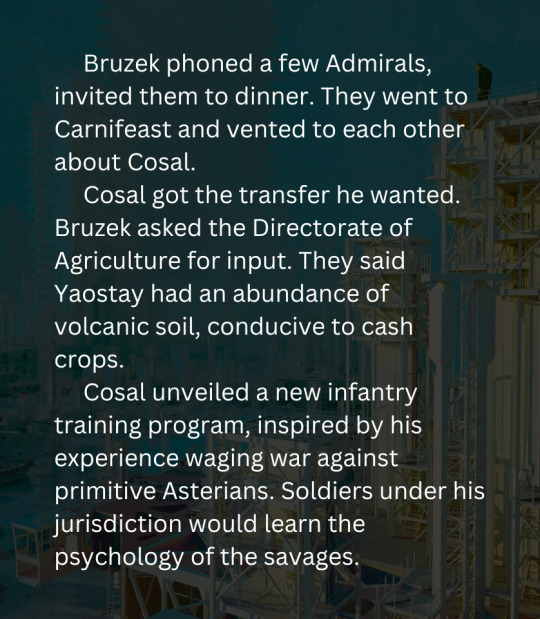


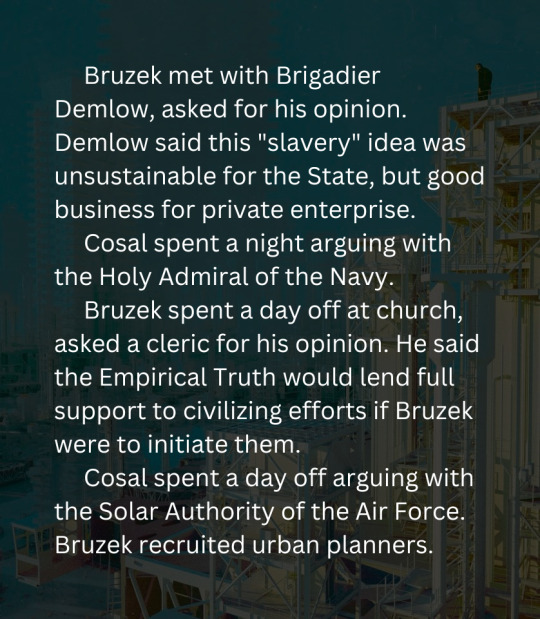
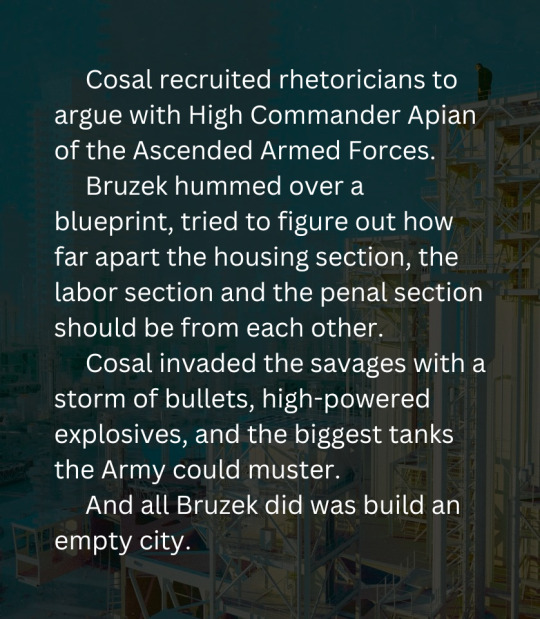
Two generals coordinated the new continent's ground offensive. One of them had plans. The other had conversations.
Cosal examined the first artifacts found on Yaostay. Axes and spears—they'd be dealing with primitives.
Bruzek sent a greeting and a request to some Heavenly Authorities from the Air Force. One of them replied with a report-in-progress on Yaostayan weather patterns.
Cosal pored over research findings, looking for the biggest tanks physics would allow.
Bruzek read the report. There was more ambient magic in Yaostay's air than anywhere else on the planet.
Cosal petitioned High Commander Apian for a 15% funding transfer from the Navy to the Army.
Bruzek phoned a few Admirals, invited them to dinner. They went to Carnifeast and vented to each other about Cosal.
Cosal got the transfer he wanted.
Bruzek asked the Directorate of Agriculture for input. They said Yaostay had an abundance of volcanic soil, conducive to cash crops.
Cosal unveiled a new infantry training program, inspired by his experience waging war against primitive Asterians. Soldiers under his jurisdiction would learn the psychology of the savages.
Bruzek invited Cosal to dinner.
Cosal accepted.
Bruzek said it was good to see him outside work for once.
Cosal said it was interesting to finally talk to Commander Bruzek as an equal.
Bruzek said murder was less efficient than conversion.
Cosal said he's still not taking orders from a former subordinate.
Bruzek shrugged.
Cosal covered the bill.
Bruzek met with Brigadier Demlow, asked for his opinion. Demlow said this "slavery" idea was unsustainable for the State, but good business for private enterprise.
Cosal spent a night arguing with the Holy Admiral of the Navy.
Bruzek spent a day off at church, asked a cleric for his opinion. He said the Empirical Truth would lend full support to civilizing efforts if Bruzek were to initiate them.
Cosal spent a day off arguing with the Solar Authority of the Air Force.
Bruzek recruited urban planners.
Cosal recruited rhetoricians to argue with High Commander Apian of the Ascended Armed Forces.
Bruzek hummed over a blueprint, tried to figure out how far apart the housing section, the labor section and the penal section should be from each other.
Cosal invaded the savages with a storm of bullets, high-powered explosives, and the biggest tanks the Army could muster.
And all Bruzek did was build an empty city.
———
Yaldev is a sci-fantasy worldbuilding project by Ulysses Maurer, with art by Beeple. By looking at narratives, stylized loredumps, bad poetry and little details, we'll witness the story of a planet filled with magical power, the nation which tried to conquer it, this empire’s dramatic collapse and the new world which emerged in its wake. Along the way we'll meet the characters who live here, and we'll explore questions about nationalism, rationalism, the natural world and the quest to master it. For all stories in chronological order, check out the pinned posts at r/Yaldev!
#beeple#fantasy#scifi#worldbuilding#writing#everyday#short story#surreal#dystopia#dystopian#dystopian fiction#science fiction#science fantasy#sci fantasy#sci-fantasy#scifantasy#sf#sff#worldbuild#worldbuilder#worldbuilders#magic#d&d#dnd#canadian writers#escapism#lore#amwriting
1 note
·
View note
Text
Industrial Remnants
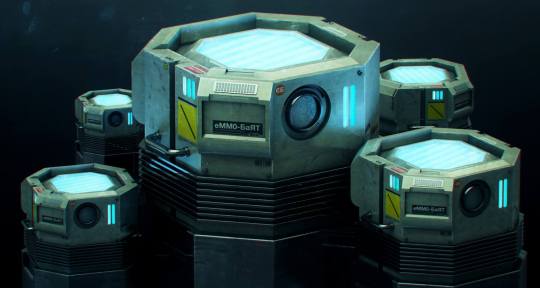
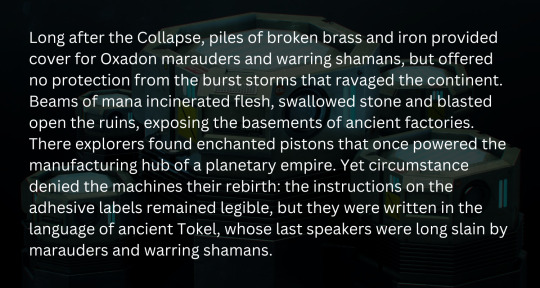
Long after the Collapse, piles of broken brass and iron provided cover for Oxadon marauders and warring shamans, but offered no protection from the burst storms that ravaged the continent. Beams of mana incinerated flesh, swallowed stone and blasted open the ruins, exposing the basements of ancient factories. There explorers found enchanted pistons that once powered the manufacturing hub of a planetary empire. Yet circumstance denied the machines their rebirth: the instructions on the adhesive labels remained legible, but they were written in the language of ancient Tokel, whose last speakers were long slain by marauders and warring shamans.
———
Yaldev is a sci-fantasy worldbuilding project by Ulysses Maurer, with art by Beeple. By looking at narratives, stylized loredumps, bad poetry and little details, we'll witness the story of a planet filled with magical power, the nation which tried to conquer it, this empire’s dramatic collapse and the new world which emerged in its wake. Along the way we'll meet the characters who live here, and we'll explore questions about nationalism, rationalism, the natural world and the quest to master it. For all stories in chronological order, check out the pinned posts at r/Yaldev!
#beeple#fantasy#scifi#worldbuilding#writing#everyday#short story#surreal#dystopia#dystopian#dystopian fiction#science fiction#science fantasy#sci fantasy#sci-fantasy#scifantasy#sf#sff#worldbuild#worldbuilder#worldbuilders#magic#d&d#dnd#canadian writers#escapism#lore#amwriting
1 note
·
View note
Text
A New Age
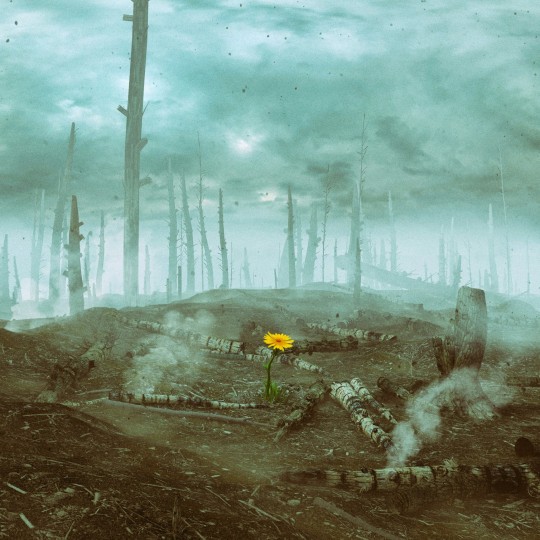
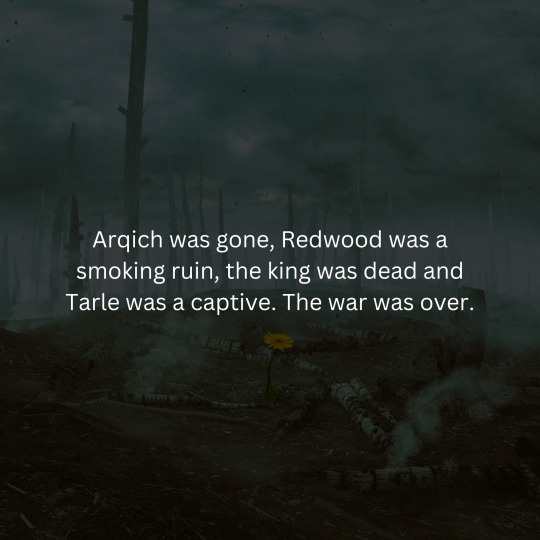
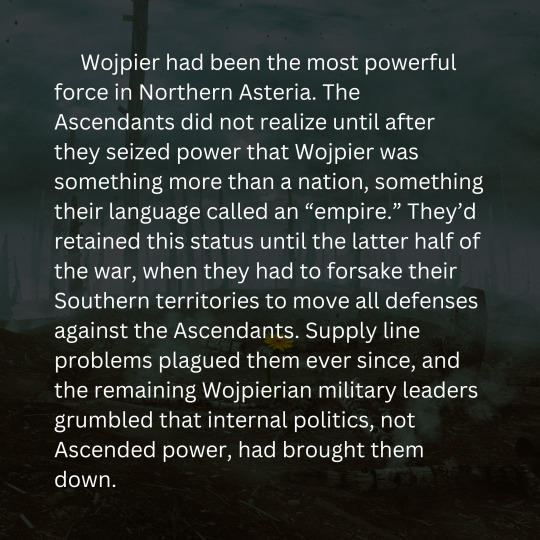
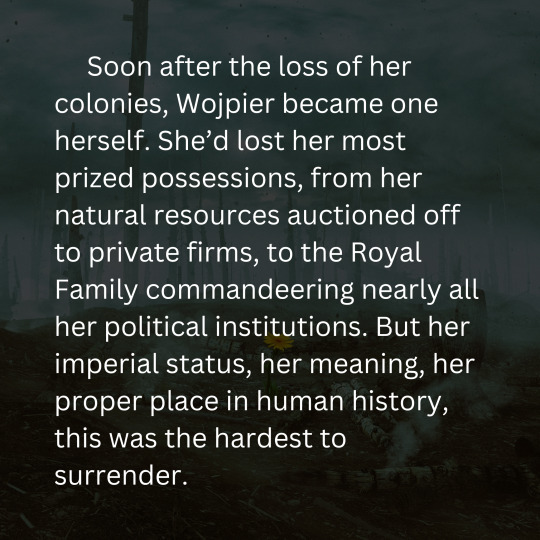


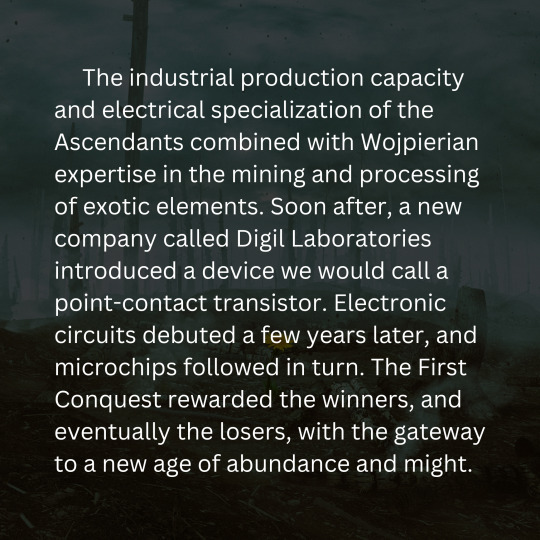
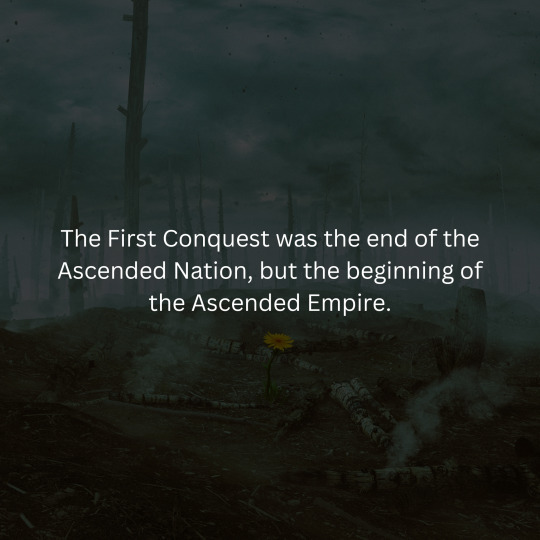
Arqich was gone, Redwood was a smoking ruin, the king was dead and Tarle was a captive. The war was over.
Wojpier had been the most powerful force in Northern Asteria. The Ascendants did not realize until after they seized power that Wojpier was something more than a nation, something their language called an “empire.” They’d retained this status until the latter half of the war, when they had to forsake their Southern territories to move all defenses against the Ascendants. Supply line problems plagued them ever since, and the remaining Wojpierian military leaders grumbled that internal politics, not Ascended power, had brought them down.
Soon after the loss of her colonies, Wojpier became one herself. She’d lost her most prized possessions, from her natural resources auctioned off to private firms, to the Royal Family commandeering nearly all her political institutions. But her imperial status, her meaning, her proper place in human history, this was the hardest to surrender.
But for all that was lost, much was kept. Native sailors were more experienced than Ascended navigators in traversing the Asterian coastline, and the conquerors would pay them well for their services. The country's network of aqueducts was nearly as efficient as the Ascendants' own water infrastructure, and scholars from each society had much to learn from the other. The colonies were lost, but two of the continent's most important rivers originated in Wojpier, so retaking the colonies would be trivial—if not as subordinates to Wojpier, then as equal partners under the Ascendants.
Most importantly, Wojpier had its own institutions of higher learning, ones specialized in different fields than the Ascendants. Of all the spoils of conquest, knowledge was the most prized. Later historians termed this post-war period the Synthesis Era, in which the specialized knowledge of Ascended and Wojpierian academics, craftsmen, scientists, artists and mages were blended in a scurry of mutual excitement and curiosity. Over the course of a generation, technology advanced at a speed never seen before in Yaldev’s history.
The industrial production capacity and electrical specialization of the Ascendants combined with Wojpierian expertise in the mining and processing of exotic elements. Soon after, a new company called Digil Laboratories introduced a device we would call a point-contact transistor. Electronic circuits debuted a few years later, and microchips followed in turn. The First Conquest rewarded the winners, and eventually the losers, with the gateway to a new age of abundance and might.
The First Conquest was the end of the Ascended Nation, but the beginning of the Ascended Empire.
———
Yaldev is a sci-fantasy worldbuilding project by Ulysses Maurer, with art by Beeple. By looking at narratives, stylized loredumps, bad poetry and little details, we'll witness the story of a planet filled with magical power, the nation which tried to conquer it, this empire’s dramatic collapse and the new world which emerged in its wake. Along the way we'll meet the characters who live here, and we'll explore questions about nationalism, rationalism, the natural world and the quest to master it. For all stories in chronological order, check out the pinned posts at r/Yaldev!
#beeple#fantasy#scifi#worldbuilding#writing#everyday#short story#surreal#dystopia#dystopian#dystopian fiction#science fiction#science fantasy#sci fantasy#sci-fantasy#scifantasy#sf#sff#worldbuild#worldbuilder#worldbuilders#magic#d&d#dnd#canadian writers#escapism#lore#amwriting
1 note
·
View note
Text
Regicide

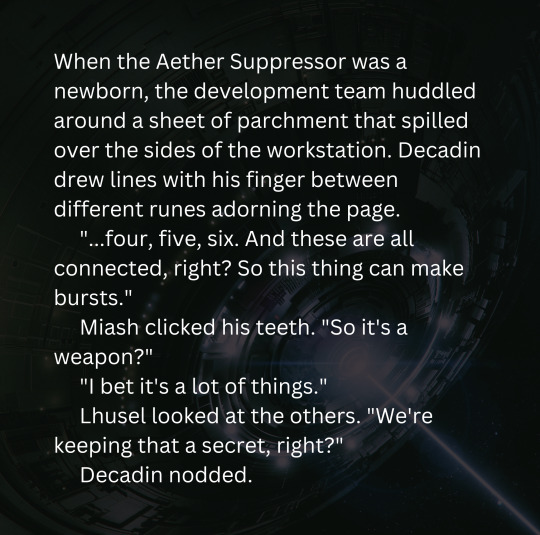
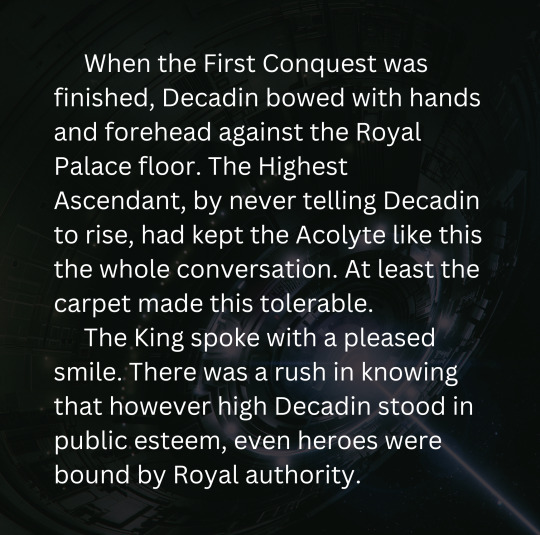
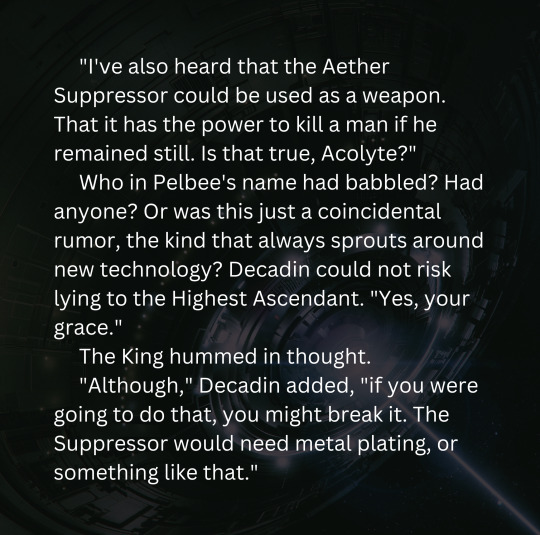
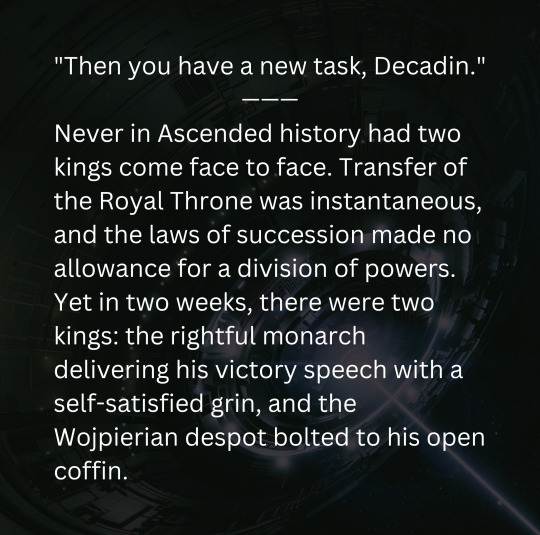
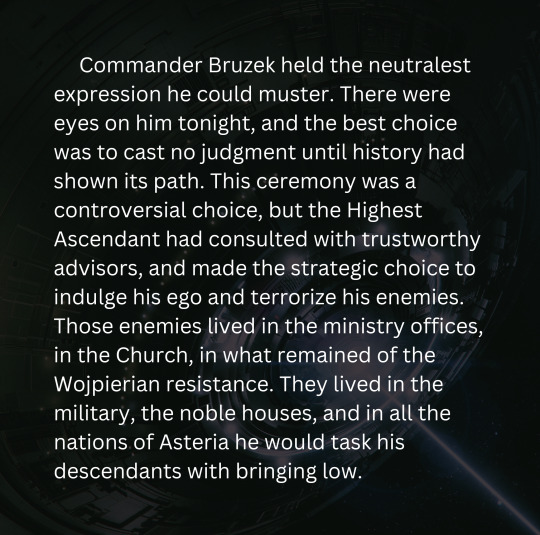
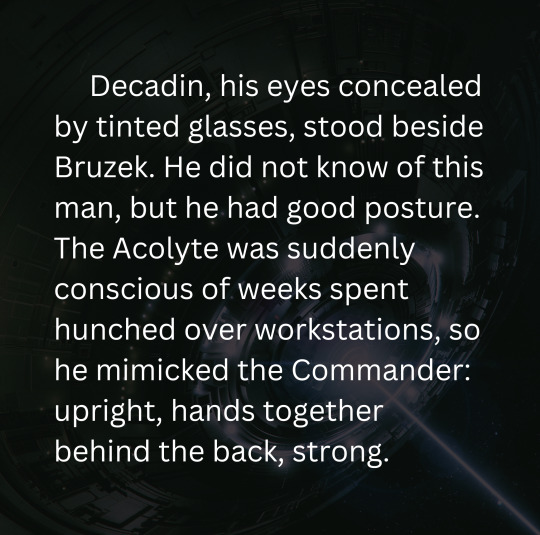
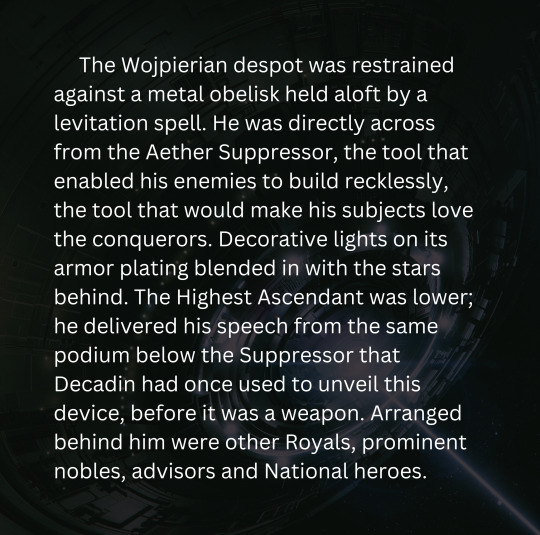
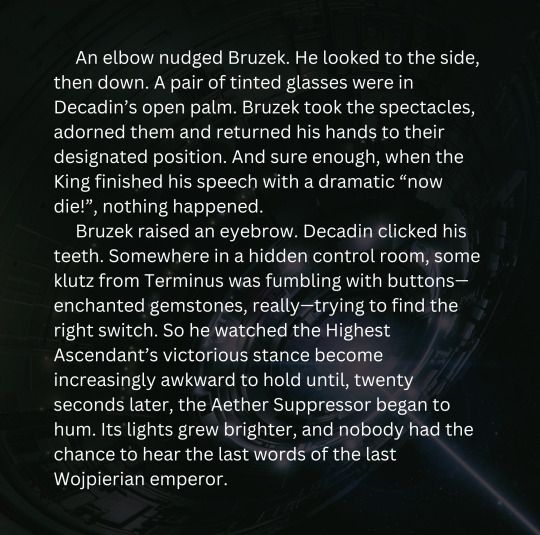
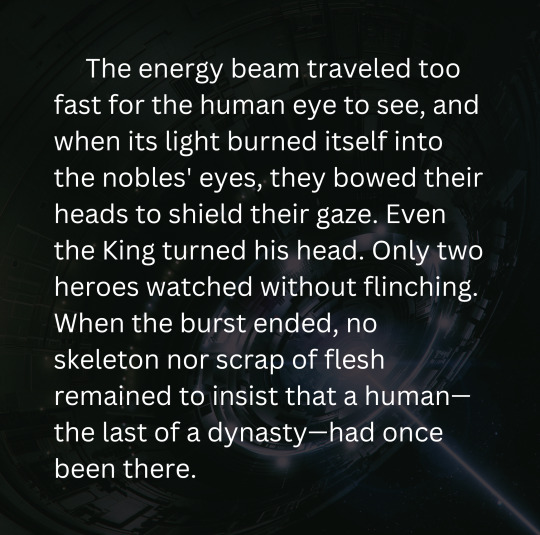
When the Aether Suppressor was a newborn, the development team huddled around a sheet of parchment that spilled over the sides of the workstation. Decadin drew lines with his finger between different runes adorning the page.
"...four, five, six. And these are all connected, right? So this thing can make bursts."
Miash clicked his teeth. "So it's a weapon?"
"I bet it's a lot of things."
Lhusel looked at the others. "We're keeping that a secret, right?"
Decadin nodded.
When the First Conquest was finished, Decadin bowed with hands and forehead against the Royal Palace floor. The Highest Ascendant, by never telling Decadin to rise, had kept the Acolyte like this the whole conversation. At least the carpet made this tolerable.
The King spoke with a pleased smile. There was a rush in knowing that however high Decadin stood in public esteem, even heroes were bound by Royal authority.
"I've also heard that the Aether Suppressor could be used as a weapon. That it has the power to kill a man if he remained still. Is that true, Acolyte?"
Who in Pelbee's name had babbled? Had anyone? Or was this just a coincidental rumor, the kind that always sprouts around new technology? Decadin could not risk lying to the Highest Ascendant. "Yes, your grace."
The King hummed in thought.
"Although," Decadin added, "if you were going to do that, you might break it. The Suppressor would need metal plating, or something like that."
"Then you have a new task, Decadin."
———
Never in Ascended history had two kings come face to face. Transfer of the Royal Throne was instantaneous, and the laws of succession made no allowance for a division of powers. Yet in two weeks, there were two kings: the rightful monarch delivering his victory speech with a self-satisfied grin, and the Wojpierian despot bolted to his open coffin.
Commander Bruzek held the neutralest expression he could muster. There were eyes on him tonight, and the best choice was to cast no judgment until history had shown its path. This ceremony was a controversial choice, but the Highest Ascendant had consulted with trustworthy advisors, and made the strategic choice to indulge his ego and terrorize his enemies. Those enemies lived in the ministry offices, in the Church, in what remained of the Wojpierian resistance. They lived in the military, the noble houses, and in all the nations of Asteria he would task his descendants with bringing low.
Decadin, his eyes concealed by tinted glasses, stood beside Bruzek. He did not know of this man, but he had good posture. The Acolyte was suddenly conscious of weeks spent hunched over workstations, so he mimicked the Commander: upright, hands together behind the back, strong.
The Wojpierian despot was restrained against a metal obelisk held aloft by a levitation spell. He was directly across from the Aether Suppressor, the tool that enabled his enemies to build recklessly, the tool that would make his subjects love the conquerors. Decorative lights on its armor plating blended in with the stars behind. The Highest Ascendant was lower; he delivered his speech from the same podium below the Suppressor that Decadin had once used to unveil this device, before it was a weapon. Arranged behind him were other Royals, prominent nobles, advisors and National heroes.
An elbow nudged Bruzek. He looked to the side, then down. A pair of tinted glasses were in Decadin’s open palm. Bruzek took the spectacles, adorned them and returned his hands to their designated position. And sure enough, when the King finished his speech with a dramatic “now die!”, nothing happened.
Bruzek raised an eyebrow. Decadin clicked his teeth. Somewhere in a hidden control room, some klutz from Terminus was fumbling with buttons—enchanted gemstones, really—trying to find the right switch. So he watched the Highest Ascendant’s victorious stance become increasingly awkward to hold until, twenty seconds later, the Aether Suppressor began to hum. Its lights grew brighter, and nobody had the chance to hear the last words of the last Wojpierian emperor.
The energy beam traveled too fast for the human eye to see, and when its light burned itself into the nobles' eyes, they bowed their heads to shield their gaze. Even the King turned his head. Only two heroes watched without flinching. When the burst ended, no skeleton nor scrap of flesh remained to insist that a human—the last of a dynasty—had once been there.
———
Yaldev is a sci-fantasy worldbuilding project by Ulysses Maurer, with art by Beeple. By looking at narratives, stylized loredumps, bad poetry and little details, we'll witness the story of a planet filled with magical power, the nation which tried to conquer it, this empire’s dramatic collapse and the new world which emerged in its wake. Along the way we'll meet the characters who live here, and we'll explore questions about nationalism, rationalism, the natural world and the quest to master it. For all stories in chronological order, check out the pinned posts at r/Yaldev!
#beeple#fantasy#scifi#worldbuilding#writing#everyday#short story#surreal#dystopia#dystopian#dystopian fiction#science fiction#science fantasy#sci fantasy#sci-fantasy#scifantasy#sf#sff#worldbuild#worldbuilder#worldbuilders#magic#d&d#dnd#canadian writers#escapism#lore#amwriting
0 notes
Text
Dread Fighter Tarle
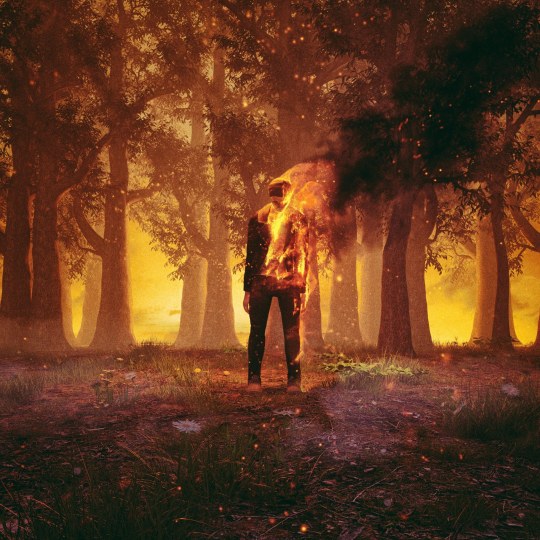
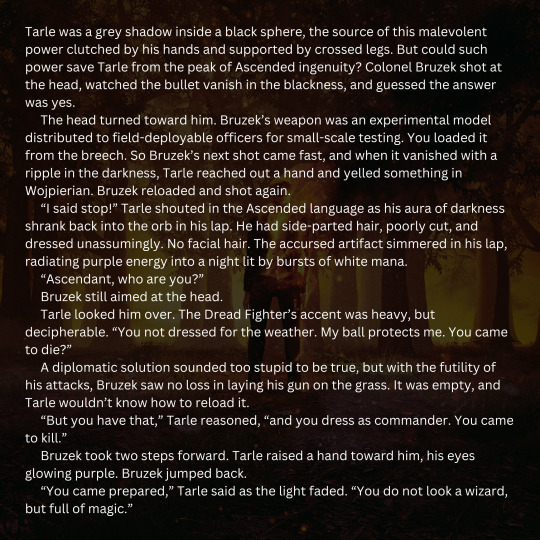

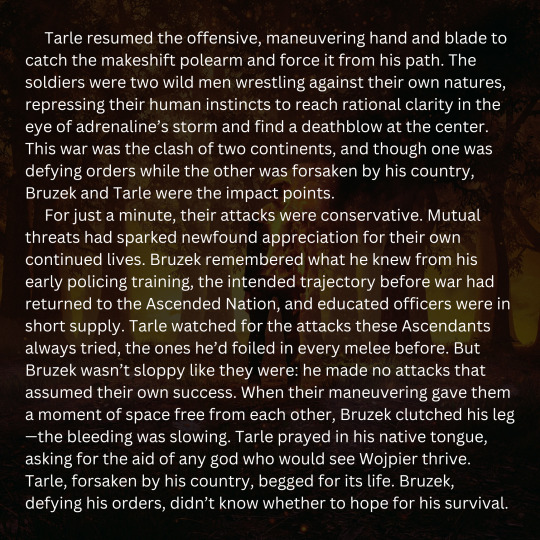
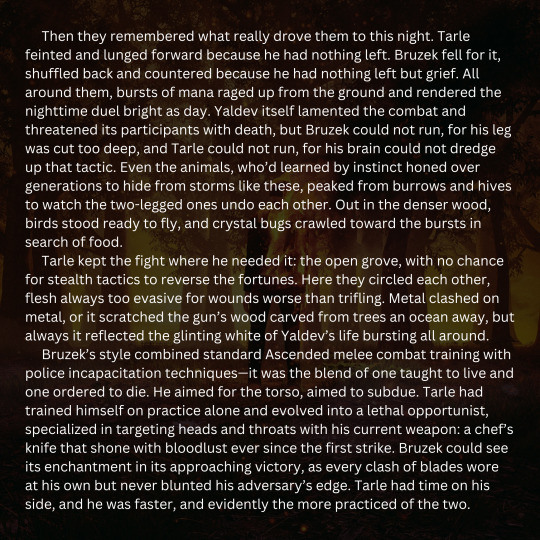

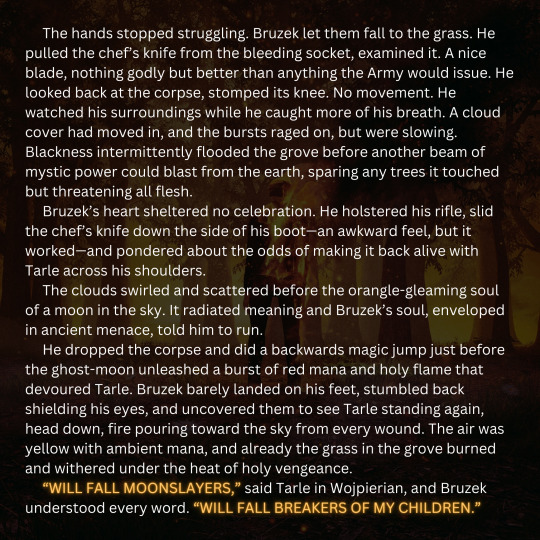
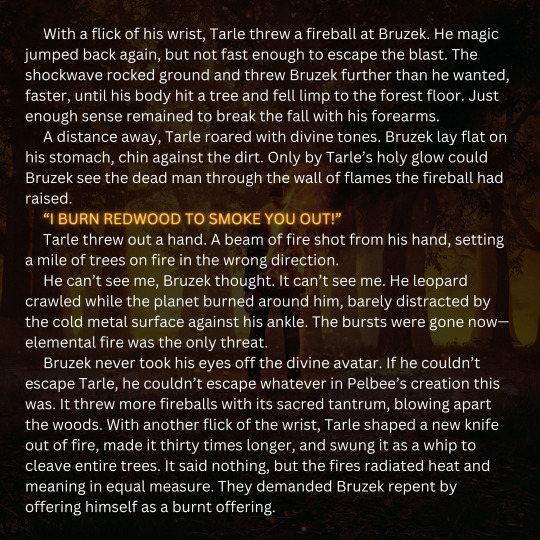
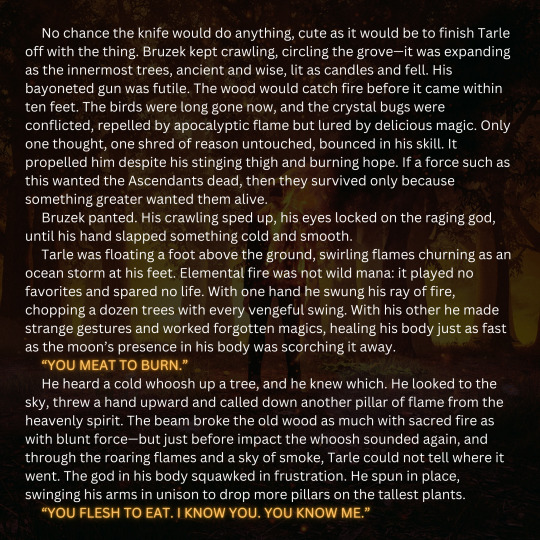
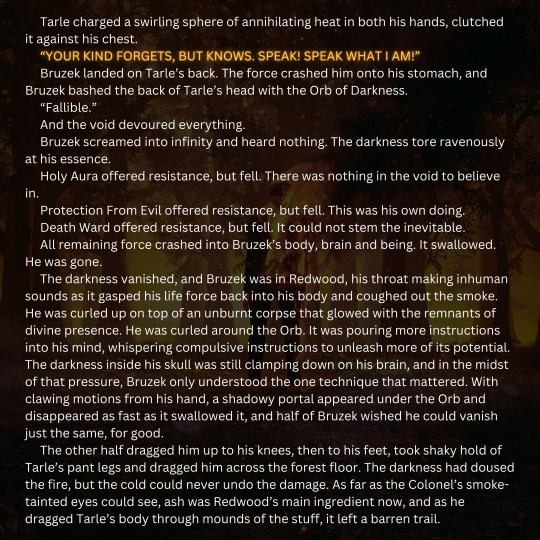
Tarle was a grey shadow inside a black sphere, the source of this malevolent power clutched by his hands and supported by crossed legs. But could such power save Tarle from the peak of Ascended ingenuity? Colonel Bruzek shot at the head, watched the bullet vanish in the blackness, and guessed the answer was yes.
The head turned toward him. Bruzek’s weapon was an experimental model distributed to field-deployable officers for small-scale testing. You loaded it from the breech. So Bruzek’s next shot came fast, and when it vanished with a ripple in the darkness, Tarle reached out a hand and yelled something in Wojpierian. Bruzek reloaded and shot again.
“I said stop!” Tarle shouted in the Ascended language as his aura of darkness shrank back into the orb in his lap. He had side-parted hair, poorly cut, and dressed unassumingly. No facial hair. The accursed artifact simmered in his lap, radiating purple energy into a night lit by bursts of white mana.
“Ascendant, who are you?”
Bruzek still aimed at the head.
Tarle looked him over. The Dread Fighter’s accent was heavy, but decipherable. “You not dressed for the weather. My ball protects me. You came to die?”
A diplomatic solution sounded too stupid to be true, but with the futility of his attacks, Bruzek saw no loss in laying his gun on the grass. It was empty, and Tarle wouldn’t know how to reload it.
“But you have that,” Tarle reasoned, “and you dress as commander. You came to kill.”
Bruzek took two steps forward. Tarle raised a hand toward him, his eyes glowing purple. Bruzek jumped back.
“You came prepared,” Tarle said as the light faded. “You do not look a wizard, but full of magic.”
“In our language, these enchantments have names.” Bruzek resumed his advance, pouring sacred menace into his tone. “We call them Holy Aura, Protection From Evil and Death Ward. I borrowed them from the holiest scrolls. If you’re luring me into tricks, none of your darkness can touch me.”
Tarle watched the Colonel’s shins. “There is difference, Ascendant. You one god, and trust it with your life. We many gods, so we know gods better than you.”
Bruzek stopped an arm’s length from his target. “I put down my weapon. Will you come peacefully?”
Tarle looked down. “You cannot rely on gods save you. They fallible.”
Bruzek grabbed his target’s hair. “Peace? Do you know that word?”
Tarle drew a chef’s knife and grabbed Bruzek’s pant leg. Bruzek raised his knee, but too late to dodge a deep stab. He yelled in pain, and as he fell forward he drove his knee into Tarle’s eye socket. The other eye glowed purple as the Orb of Darkness channeled power in the Dread Fighter’s grasp. Bruzek panicked and cast the only combat spell he knew: mana coursed through his bleeding leg as he struck the Orb with his heel and “jumped.” He and the artifact flew in opposite directions, both out of Tarle’s grasp. Bruzek spotted his gun in his peripheral vision, rushed to retrieve it.
“Fine!” Tarle shouted, taking cover behind a tree. “I won’t need it!” A bang, and the tree vibrated. Another bang, and the tree trembled. The Dread Fighter listened close, barely caught the Ascendant cursing to himself, and sprinted with knife in hand toward the invader. Bruzek grinned, fired his last shot, saw it break the grass just behind the target, and frowned. Tarle shouted his courage and drew closer. Bruzek swiftly drew his bayonet, feinted a thrust to slow the coming charge, plugged the blade into his gun barrel and stood his ground.
Tarle resumed the offensive, maneuvering hand and blade to catch the makeshift polearm and force it from his path. The soldiers were two wild men wrestling against their own natures, repressing their human instincts to reach rational clarity in the eye of adrenaline’s storm and find a deathblow at the center. This war was the clash of two continents, and though one was defying orders while the other was forsaken by his country, Bruzek and Tarle were the impact points.
For just a minute, their attacks were conservative. Mutual threats had sparked newfound appreciation for their own continued lives. Bruzek remembered what he knew from his early policing training, the intended trajectory before war had returned to the Ascended Nation, and educated officers were in short supply. Tarle watched for the attacks these Ascendants always tried, the ones he’d foiled in every melee before. But Bruzek wasn’t sloppy like they were: he made no attacks that assumed their own success. When their maneuvering gave them a moment of space free from each other, Bruzek clutched his leg—the bleeding was slowing. Tarle prayed in his native tongue, asking for the aid of any god who would see Wojpier thrive. Tarle, forsaken by his country, begged for its life. Bruzek, defying his orders, didn’t know whether to hope for his survival.
Then they remembered what really drove them to this night. Tarle feinted and lunged forward because he had nothing left. Bruzek fell for it, shuffled back and countered because he had nothing left but grief. All around them, bursts of mana raged up from the ground and rendered the nighttime duel bright as day. Yaldev itself lamented the combat and threatened its participants with death, but Bruzek could not run, for his leg was cut too deep, and Tarle could not run, for his brain could not dredge up that tactic. Even the animals, who’d learned by instinct honed over generations to hide from storms like these, peaked from burrows and hives to watch the two-legged ones undo each other. Out in the denser wood, birds stood ready to fly, and crystal bugs crawled toward the bursts in search of food.
Tarle kept the fight where he needed it: the open grove, with no chance for stealth tactics to reverse the fortunes. Here they circled each other, flesh always too evasive for wounds worse than trifling. Metal clashed on metal, or it scratched the gun’s wood carved from trees an ocean away, but always it reflected the glinting white of Yaldev’s life bursting all around.
Bruzek’s style combined standard Ascended melee combat training with police incapacitation techniques—it was the blend of one taught to live and one ordered to die. He aimed for the torso, aimed to subdue. Tarle had trained himself on practice alone and evolved into a lethal opportunist, specialized in targeting heads and throats with his current weapon: a chef’s knife that shone with bloodlust ever since the first strike. Bruzek could see its enchantment in its approaching victory, as every clash of blades wore at his own but never blunted his adversary’s edge. Tarle had time on his side, and he was faster, and evidently the more practiced of the two.
But there were three reasons Bruzek won, and he knew two of them: his arms were just stronger, he had double the functioning eyes, and he was a sonless father. Tarle reached for Bruzek’s weapon, tried to rip it from his grasp, knocked it to the ground instead, and swung his knife. Depth perception failed his aim. Bruzek grabbed Tarle’s arm, wrestled him to his back, and both the Colonel’s hands held the Dread Fighter’s fist shut around the handle. Tarle gripped his own wrist and pushed back with all his remaining might, his eyes flicking desperately between the slowly-approaching point and Bruzek’s eyes of malevolent red. All the arms trembled with exhaustion, but Tarle’s trembled more when the knife pierced his ocular surface, and his strength gave way as the knife drove handle deep into his head, severing memories and motor function. In one fast move, Bruzek pried Tarle’s fingers off the knife, held his hands apart, rose and stomped the handle deeper into the skull.
The Dread Fighter wailed, and Bruzek clutched those deadly hands until the wails shrank into weeping murmurs in his native tongue. Bruzek’s heart sheltered no pity. The mangled face looked a little more like Cosal’s now, and his imagination imposed his commander’s begging over the Wojpierian nonsense. But Tarle’s fading breath was a prayer, begging the aid of any god, any god, who would see the Ascendants fall.
The hands stopped struggling. Bruzek let them fall to the grass. He pulled the chef’s knife from the bleeding socket, examined it. A nice blade, nothing godly but better than anything the Army would issue. He looked back at the corpse, stomped its knee. No movement. He watched his surroundings while he caught more of his breath. A cloud cover had moved in, and the bursts raged on, but were slowing. Blackness intermittently flooded the grove before another beam of mystic power could blast from the earth, sparing any trees it touched but threatening all flesh.
Bruzek’s heart sheltered no celebration. He holstered his rifle, slid the chef’s knife down the side of his boot—an awkward feel, but it worked—and pondered about the odds of making it back alive with Tarle across his shoulders.
The clouds swirled and scattered before the orangle-gleaming soul of a moon in the sky. It radiated meaning and Bruzek’s soul, enveloped in ancient menace, told him to run.
He dropped the corpse and did a backwards magic jump just before the ghost-moon unleashed a burst of red mana and holy flame that devoured Tarle. Bruzek barely landed on his feet, stumbled back shielding his eyes, and uncovered them to see Tarle standing again, head down, fire pouring toward the sky from every wound. The air was yellow with ambient mana, and already the grass in the grove burned and withered under the heat of holy vengeance.
“WILL FALL MOONSLAYERS,” said Tarle in Wojpierian, and Bruzek understood every word. “WILL FALL BREAKERS OF MY CHILDREN.”
With a flick of his wrist, Tarle threw a fireball at Bruzek. He magic jumped back again, but not fast enough to escape the blast. The shockwave rocked ground and threw Bruzek further than he wanted, faster, until his body hit a tree and fell limp to the forest floor. Just enough sense remained to break the fall with his forearms.
A distance away, Tarle roared with divine tones. Bruzek lay flat on his stomach, chin against the dirt. Only by Tarle’s holy glow could Bruzek see the dead man through the wall of flames the fireball had raised.
“I BURN REDWOOD TO SMOKE YOU OUT!”
Tarle threw out a hand. A beam of fire shot from his hand, setting a mile of trees on fire in the wrong direction.
He can’t see me, Bruzek thought. It can’t see me. He leopard crawled while the planet burned around him, barely distracted by the cold metal surface against his ankle. The bursts were gone now—elemental fire was the only threat.
Bruzek never took his eyes off the divine avatar. If he couldn’t escape Tarle, he couldn’t escape whatever in Pelbee’s creation this was. It threw more fireballs with its sacred tantrum, blowing apart the woods. With another flick of the wrist, Tarle shaped a new knife out of fire, made it thirty times longer, and swung it as a whip to cleave entire trees. It said nothing, but the fires radiated heat and meaning in equal measure. They demanded Bruzek repent by offering himself as a burnt offering.
No chance the knife would do anything, cute as it would be to finish Tarle off with the thing. Bruzek kept crawling, circling the grove—it was expanding as the innermost trees, ancient and wise, lit as candles and fell. His bayoneted gun was futile. The wood would catch fire before it came within ten feet. The birds were long gone now, and the crystal bugs were conflicted, repelled by apocalyptic flame but lured by delicious magic. Only one thought, one shred of reason untouched, bounced in his skill. It propelled him despite his stinging thigh and burning hope. If a force such as this wanted the Ascendants dead, then they survived only because something greater wanted them alive.
Bruzek panted. His crawling sped up, his eyes locked on the raging god, until his hand slapped something cold and smooth.
Tarle was floating a foot above the ground, swirling flames churning as an ocean storm at his feet. Elemental fire was not wild mana: it played no favorites and spared no life. With one hand he swung his ray of fire, chopping a dozen trees with every vengeful swing. With his other he made strange gestures and worked forgotten magics, healing his body just as fast as the moon’s presence in his body was scorching it away.
“YOU MEAT TO BURN.”
He heard a cold whoosh up a tree, and he knew which. He looked to the sky, threw a hand upward and called down another pillar of flame from the heavenly spirit. The beam broke the old wood as much with sacred fire as with blunt force—but just before impact the whoosh sounded again, and through the roaring flames and a sky of smoke, Tarle could not tell where it went. The god in his body squawked in frustration. He spun in place, swinging his arms in unison to drop more pillars on the tallest plants.
“YOU FLESH TO EAT. I KNOW YOU. YOU KNOW ME.”
Tarle charged a swirling sphere of annihilating heat in both his hands, clutched it against his chest.
“YOUR KIND FORGETS, BUT KNOWS. SPEAK! SPEAK WHAT I AM!”
Bruzek landed on Tarle’s back. The force crashed him onto his stomach, and Bruzek bashed the back of Tarle’s head with the Orb of Darkness.
“Fallible.”
And the void devoured everything.
Bruzek screamed into infinity and heard nothing. The darkness tore ravenously at his essence.
Holy Aura offered resistance, but fell. There was nothing in the void to believe in.
Protection From Evil offered resistance, but fell. This was his own doing.
Death Ward offered resistance, but fell. It could not stem the inevitable.
All remaining force crashed into Bruzek’s body, brain and being. It swallowed. He was gone.
The darkness vanished, and Bruzek was in Redwood, his throat making inhuman sounds as it gasped his life force back into his body and coughed out the smoke. He was curled up on top of an unburnt corpse that glowed with the remnants of divine presence. He was curled around the Orb. It was pouring more instructions into his mind, whispering compulsive instructions to unleash more of its potential. The darkness inside his skull was still clamping down on his brain, and in the midst of that pressure, Bruzek only understood the one technique that mattered. With clawing motions from his hand, a shadowy portal appeared under the Orb and disappeared as fast as it swallowed it, and half of Bruzek wished he could vanish just the same, for good.
The other half dragged him up to his knees, then to his feet, took shaky hold of Tarle’s pant legs and dragged him across the forest floor. The darkness had doused the fire, but the cold could never undo the damage. As far as the Colonel’s smoke-tainted eyes could see, ash was Redwood’s main ingredient now, and as he dragged Tarle’s body through mounds of the stuff, it left a barren trail.
---
Yaldev is a sci-fantasy worldbuilding project by Ulysses Maurer, with art by Beeple. By looking at narratives, stylized loredumps, bad poetry and little details, we'll witness the story of a planet filled with magical power, the nation which tried to conquer it, this empire’s dramatic collapse and the new world which emerged in its wake. Along the way we'll meet the characters who live here, and we'll explore questions about nationalism, rationalism, the natural world and the quest to master it. For all stories in chronological order, check out the pinned posts at r/Yaldev!
#beeple#fantasy#scifi#worldbuilding#writing#everyday#short story#surreal#dystopia#dystopian#dystopian fiction#science fiction#science fantasy#sci fantasy#sci-fantasy#scifantasy#sf#sff#worldbuild#worldbuilder#worldbuilders#magic#d&d#dnd#canadian writers#escapism#lore#amwriting
0 notes
Text
Lightning Mines

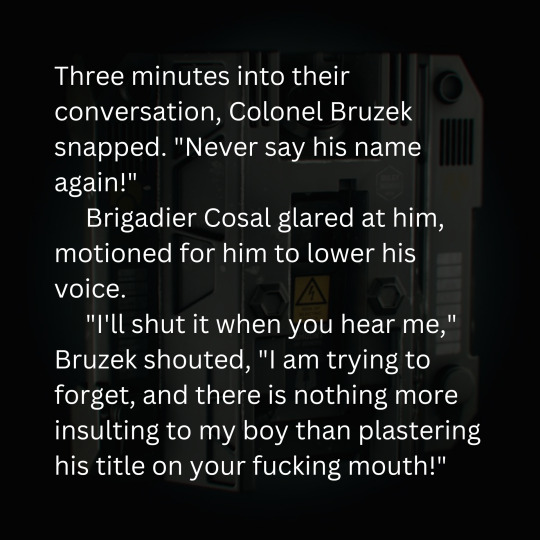
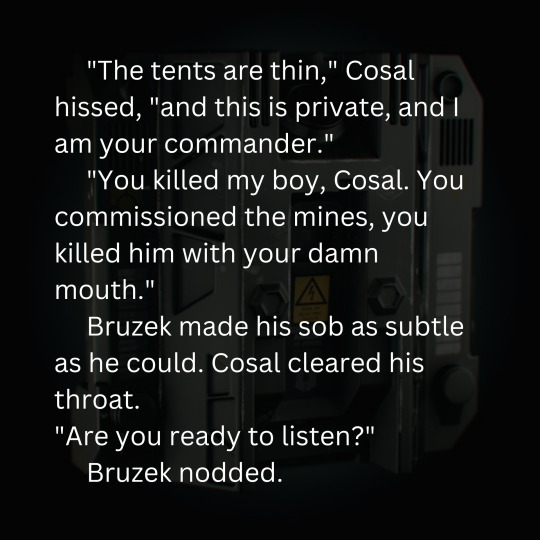
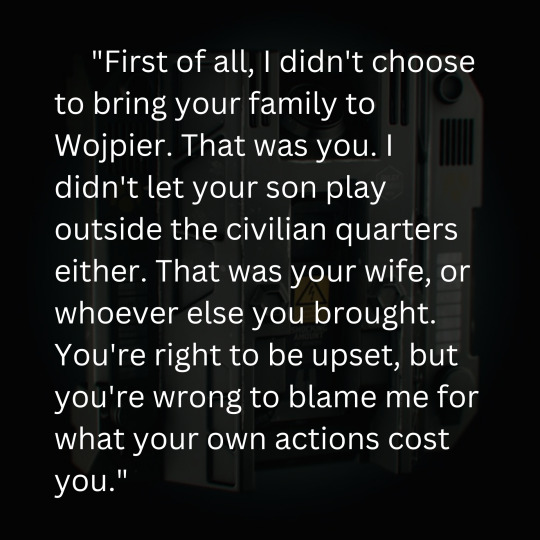
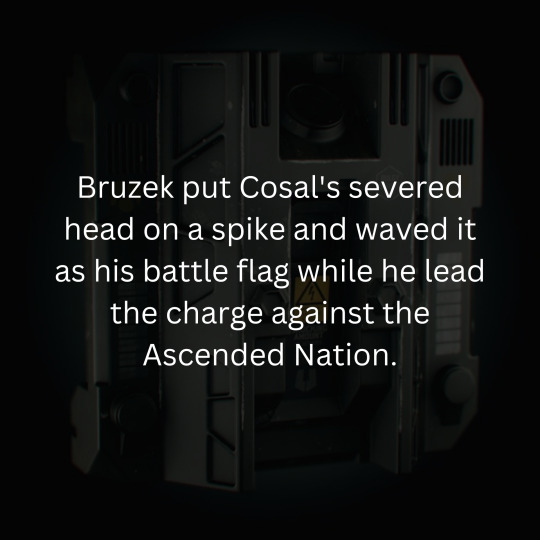
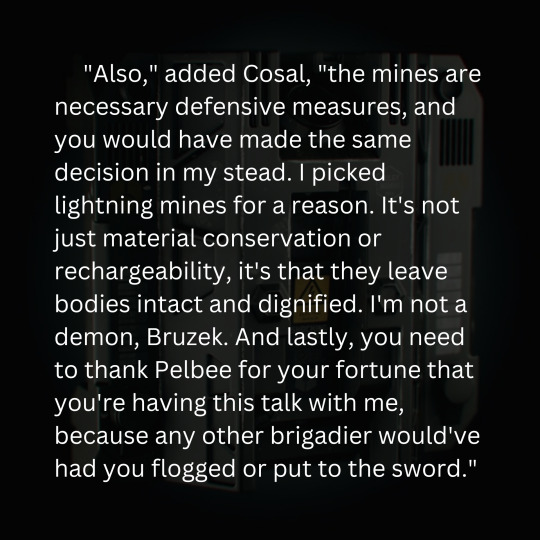
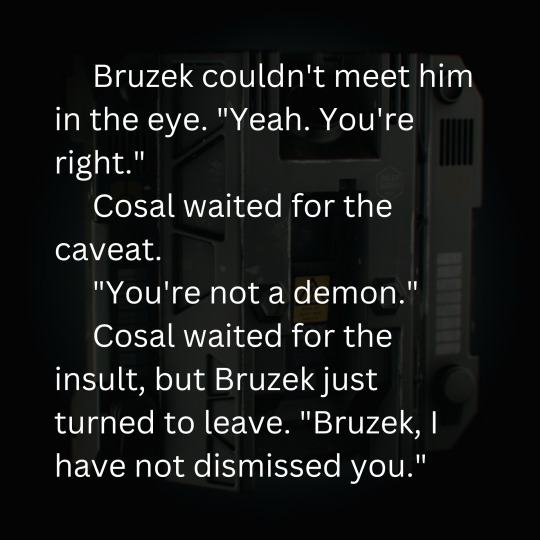

Three minutes into their conversation, Colonel Bruzek snapped. "Never say his name again!"
Brigadier Cosal glared at him, motioned for him to lower his voice.
"I'll shut it when you hear me," Bruzek shouted, "I am trying to forget, and there is nothing more insulting to my boy than plastering his title on your fucking mouth!"
"The tents are thin," Cosal hissed, "and this is private, and I am your commander."
"You killed my boy, Cosal. You commissioned the mines, you killed him with your damn mouth."
Bruzek made his sob as subtle as he could. Cosal cleared his throat.
"Are you ready to listen?"
Bruzek nodded.
"First of all, I didn't choose to bring your family to Wojpier. That was you. I didn't let your son play outside the civilian quarters either. That was your wife, or whoever else you brought. You're right to be upset, but you're wrong to blame me for what your own actions cost you."
Bruzek put Cosal's severed head on a spike and waved it as his battle flag while he lead the charge against the Ascended Nation.
"Also," added Cosal, "the mines are necessary defensive measures, and you would have made the same decision in my stead. I picked lightning mines for a reason. It's not just material conservation or rechargeability, it's that they leave bodies intact and dignified. I'm not a demon, Bruzek. And lastly, you need to thank Pelbee for your fortune that you're having this talk with me, because any other brigadier would've had you flogged or put to the sword."
Bruzek couldn't meet him in the eye. "Yeah. You're right."
Cosal waited for the caveat.
"You're not a demon."
Cosal waited for the insult, but Bruzek just turned to leave. "Bruzek, I have not dismissed you."
"Flog me," he grunted as he left.
"You're a good soldier," Cosal called after him, "so I will forgive you this once. We'll talk tomorrow."
Bruzek was too far now to hear any of it.
"...Dismissed."
---
Yaldev is a sci-fantasy worldbuilding project by Ulysses Maurer, with art by Beeple. By looking at narratives, stylized loredumps, bad poetry and little details, we'll witness the story of a planet filled with magical power, the nation which tried to conquer it, this empire’s dramatic collapse and the new world which emerged in its wake. Along the way we'll meet the characters who live here, and we'll explore questions about nationalism, rationalism, the natural world and the quest to master it. For all stories in chronological order, check out the pinned posts at r/Yaldev!
#beeple#fantasy#scifi#worldbuilding#writing#everyday#short story#surreal#dystopia#dystopian#dystopian fiction#science fiction#science fantasy#sci fantasy#sci-fantasy#scifantasy#sf#sff#worldbuild#worldbuilder#worldbuilders#magic#d&d#dnd#canadian writers#escapism#lore#amwriting
2 notes
·
View notes
Text
Awaiting the Signal

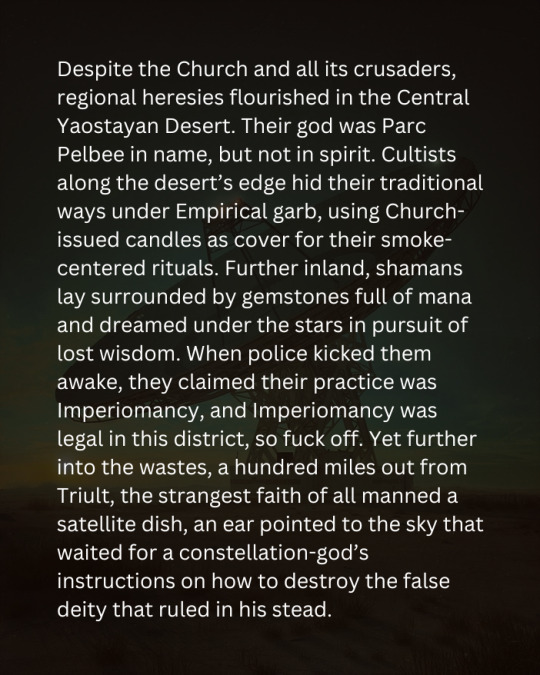
Despite the Church and all its crusaders, regional heresies flourished in the Central Yaostayan Desert. Their god was Parc Pelbee in name, but not in spirit. Cultists along the desert’s edge hid their traditional ways under Empirical garb, using Church-issued candles as cover for their smoke-centered rituals. Further inland, shamans lay surrounded by gemstones full of mana and dreamed under the stars in pursuit of lost wisdom. When police kicked them awake, they claimed their practice was Imperiomancy, and Imperiomancy was legal in this district, so fuck off. Yet further into the wastes, a hundred miles out from Triult, the strangest faith of all manned a satellite dish, an ear pointed to the sky that waited for a constellation-god’s instructions on how to destroy the false deity that ruled in his stead.
---
Yaldev is a sci-fantasy worldbuilding project by Ulysses Maurer, with art by Beeple. By looking at narratives, stylized loredumps, bad poetry and little details, we'll witness the story of a planet filled with magical power, the nation which tried to conquer it, this empire’s dramatic collapse and the new world which emerged in its wake. Along the way we'll meet the characters who live here, and we'll explore questions about nationalism, rationalism, the natural world and the quest to master it. For all stories in chronological order, check out the pinned posts at r/Yaldev!
#beeple#fantasy#scifi#worldbuilding#writing#everyday#short story#surreal#dystopia#dystopian#dystopian fiction#science fiction#science fantasy#sci fantasy#sci-fantasy#scifantasy#sf#sff#worldbuild#worldbuilder#worldbuilders#magic#d&d#dnd#canadian writers#escapism#lore#amwriting
1 note
·
View note
Text
The First Waters
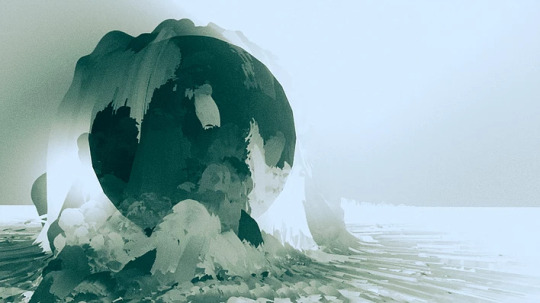
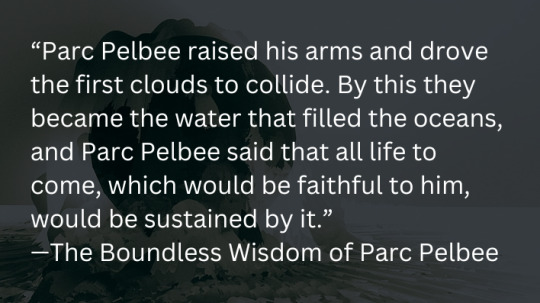
“Parc Pelbee raised his arms and drove the first clouds to collide. By this they became the water that filled the oceans, and Parc Pelbee said that all life to come, which would be faithful to him, would be sustained by it.”
—The Boundless Wisdom of Parc Pelbee
———
Yaldev is a sci-fantasy worldbuilding project by Ulysses Maurer, with art by Beeple. By looking at narratives, stylized loredumps, bad poetry and little details, we'll witness the story of a planet filled with magical power, the nation which tried to conquer it, this empire’s dramatic collapse and the new world which emerged in its wake. Along the way we'll meet the characters who live here, and we'll explore questions about nationalism, rationalism, the natural world and the quest to master it. For all stories in chronological order, check out the pinned posts at r/Yaldev!
#beeple#fantasy#scifi#worldbuilding#writing#everyday#short story#surreal#dystopia#dystopian#dystopian fiction#science fiction#science fantasy#sci fantasy#sci-fantasy#scifantasy#sf#sff#worldbuild#worldbuilder#worldbuilders#magic#d&d#dnd#canadian writers#escapism#lore#amwriting
1 note
·
View note
Text
Shaved

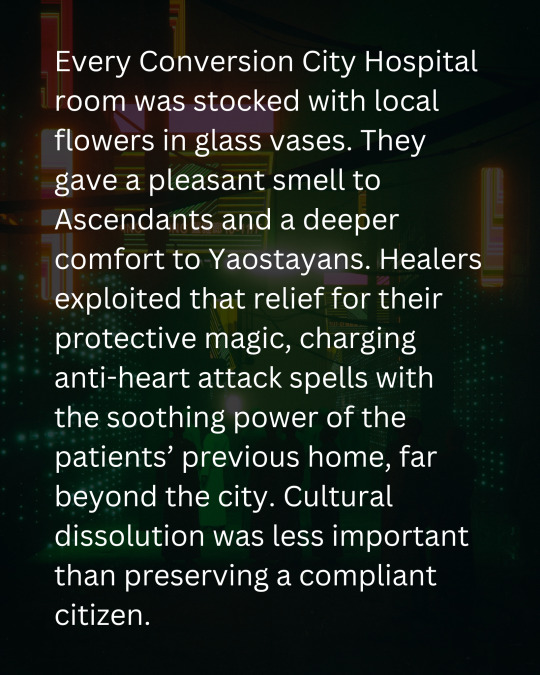

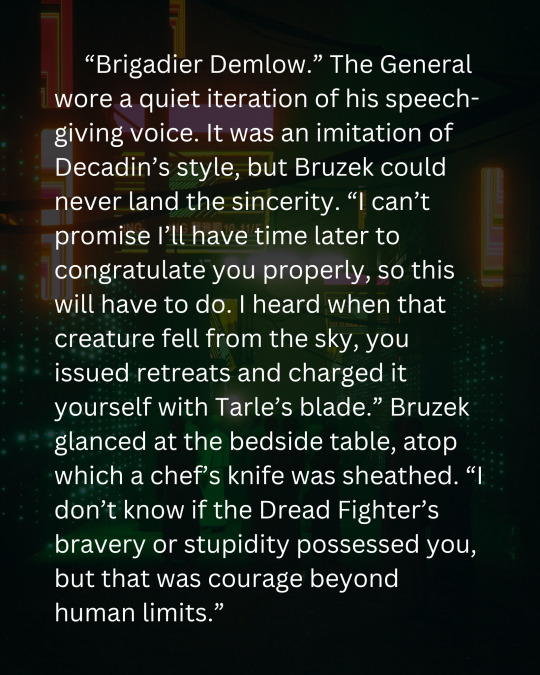
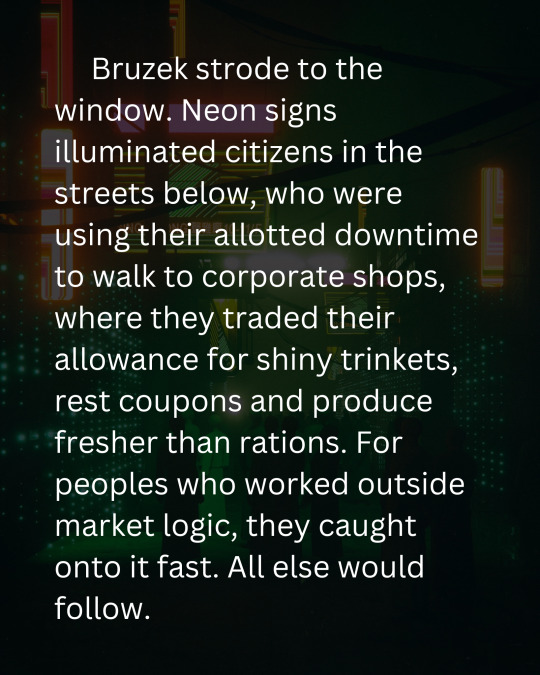
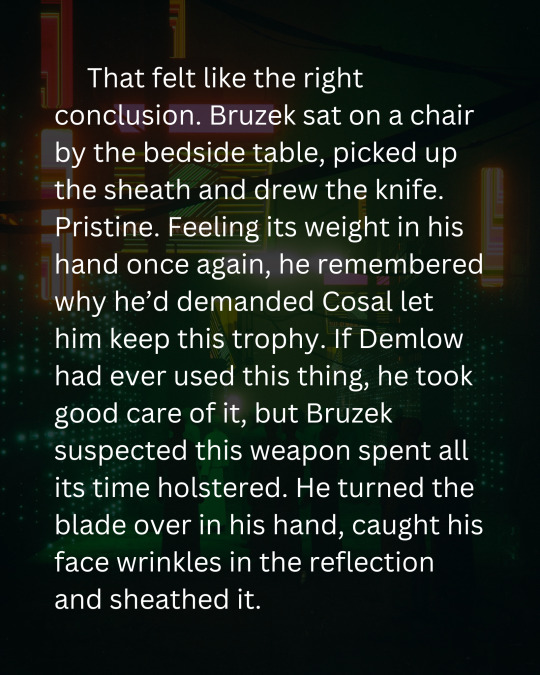

Every Conversion City Hospital room was stocked with local flowers in glass vases. They gave a pleasant smell to Ascendants and a deeper comfort to Yaostayans. Healers exploited that relief for their protective magic, charging anti-heart attack spells with the soothing power of the patients’ previous home, far beyond the city. Cultural dissolution was less important than preserving a compliant citizen.
Bruzek realized how stupid he looked checking for Demlow’s pulse, and let go of his wrist. The Brigadier was hooked up to life support with replacement blood and antitoxins, and all vitals showed life. Healers could have him up and firing in seconds. The only wait was getting some high-power cleric in from Asteria, at taxpayer expense, to cast his strongest anti-curses. Who knew what profane energies the hair elemental left in its targets? A sleeping mind was less vulnerable to such evil than a waking soul.
“Brigadier Demlow.” The General wore a quiet iteration of his speech-giving voice. It was an imitation of Decadin’s style, but Bruzek could never land the sincerity. “I can’t promise I’ll have time later to congratulate you properly, so this will have to do. I heard when that creature fell from the sky, you issued retreats and charged it yourself with Tarle’s blade.” Bruzek glanced at the bedside table, atop which a chef’s knife was sheathed. “I don’t know if the Dread Fighter’s bravery or stupidity possessed you, but that was courage beyond human limits.”
Bruzek strode to the window. Neon signs illuminated citizens in the streets below, who were using their allotted downtime to walk to corporate shops, where they traded their allowance for shiny trinkets, rest coupons and produce fresher than rations. For peoples who worked outside market logic, they caught onto it fast. All else would follow.
“No, it had to be bravery, because you had the elemental flamethrower. When the hair monster broke down the armory door, you must have ran inside. You thought there’d be something to end the fight, and with no operation manuals you used what you found.” Bruzek shook his head with a smile. “Apian would call that stupid, but you did what had to be done, knowing full well you’d have to answer to me for using a forbidden weapon without approval. My forbidden weapon. That took guts. I’ll tell Apian to get you a medal.”
That felt like the right conclusion. Bruzek sat on a chair by the bedside table, picked up the sheath and drew the knife. Pristine. Feeling its weight in his hand once again, he remembered why he’d demanded Cosal let him keep this trophy. If Demlow had ever used this thing, he took good care of it, but Bruzek suspected this weapon spent all its time holstered. He turned the blade over in his hand, caught his face wrinkles in the reflection and sheathed it.
“And don’t worry,” said Bruzek, “I’ve banned hair. Weekly shavings are mandatory for them now, and clippings get burned with the bodies. Beards too, and everything else. We can’t take chances.”
———
Yaldev is a sci-fantasy worldbuilding project by Ulysses Maurer, with art by Beeple. By looking at narratives, stylized loredumps, bad poetry and little details, we'll witness the story of a planet filled with magical power, the nation which tried to conquer it, this empire’s dramatic collapse and the new world which emerged in its wake. Along the way we'll meet the characters who live here, and we'll explore questions about nationalism, rationalism, the natural world and the quest to master it. For all stories in chronological order, check out the pinned posts at r/Yaldev!
#beeple#fantasy#scifi#worldbuilding#writing#everyday#short story#surreal#dystopia#dystopian#dystopian fiction#science fiction#science fantasy#sci fantasy#sci-fantasy#scifantasy#sf#sff#worldbuild#worldbuilder#worldbuilders#magic#d&d#dnd#canadian writers#escapism#lore#amwriting
4 notes
·
View notes
Text
Bone Reading
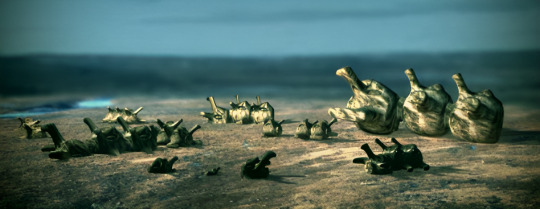

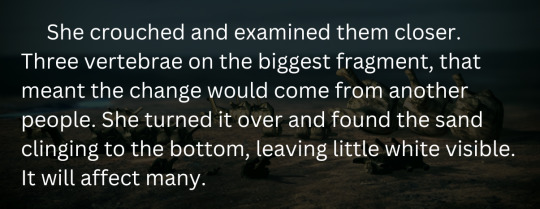
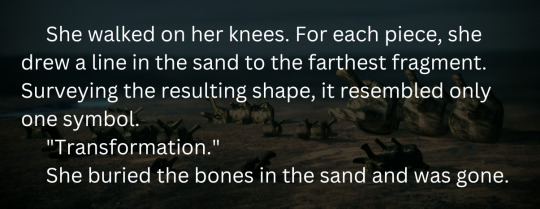
When the spines landed, they broke apart with little snapping sounds. By the light of the equinox, the seer counted twelve fragments. That meant great change.
She crouched and examined them closer. Three vertebrae on the biggest fragment, that meant the change would come from another people. She turned it over and found the sand clinging to the bottom, leaving little white visible. It will affect many.
She walked on her knees. For each piece, she drew a line in the sand to the farthest fragment. Surveying the resulting shape, it resembled only one symbol.
"Transformation."
She buried the bones in the sand and was gone.
———
Yaldev is a sci-fantasy worldbuilding project by Ulysses Maurer, with art by Beeple. By looking at narratives, stylized loredumps, bad poetry and little details, we'll witness the story of a planet filled with magical power, the nation which tried to conquer it, this empire’s dramatic collapse and the new world which emerged in its wake. Along the way we'll meet the characters who live here, and we'll explore questions about nationalism, rationalism, the natural world and the quest to master it. For all stories in chronological order, check out the pinned posts at r/Yaldev!
#beeple#fantasy#scifi#worldbuilding#writing#everyday#short story#surreal#dystopia#dystopian#dystopian fiction#science fiction#science fantasy#sci fantasy#sci-fantasy#scifantasy#sf#sff#worldbuild#worldbuilder#worldbuilders#magic#d&d#dnd#canadian writers#escapism#lore#amwriting
0 notes
Text
Mother Moon
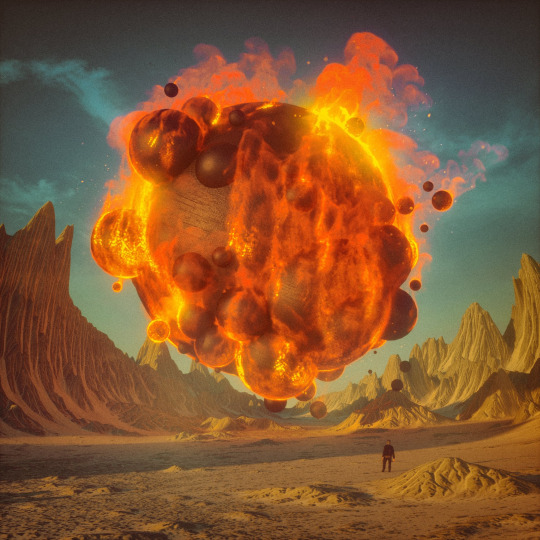
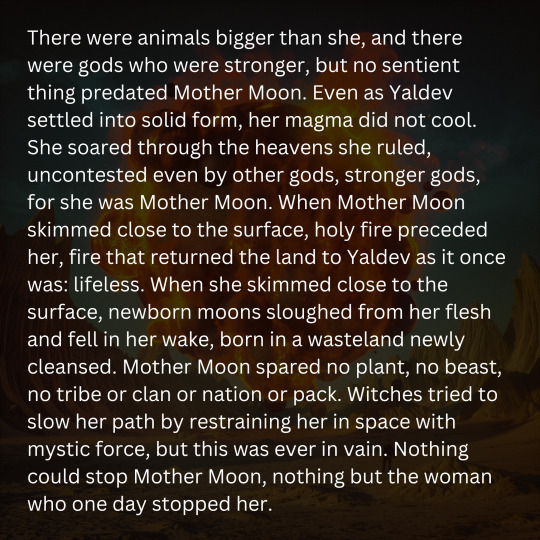

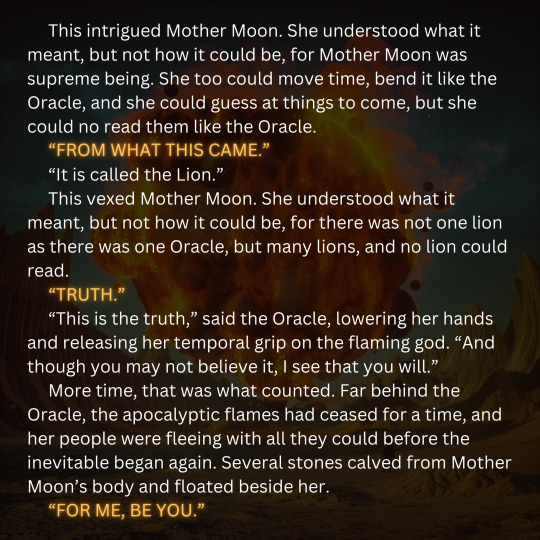
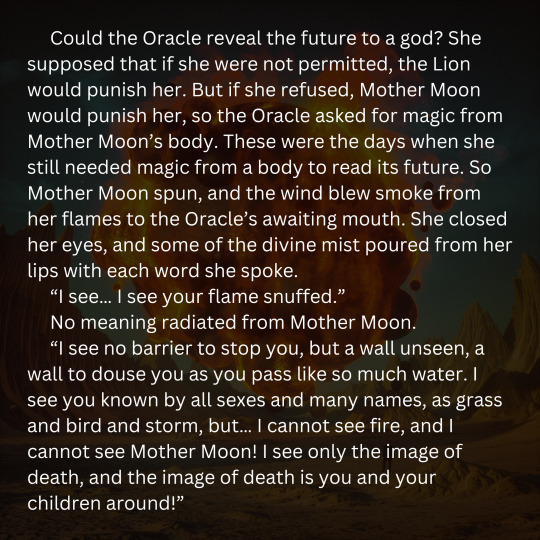
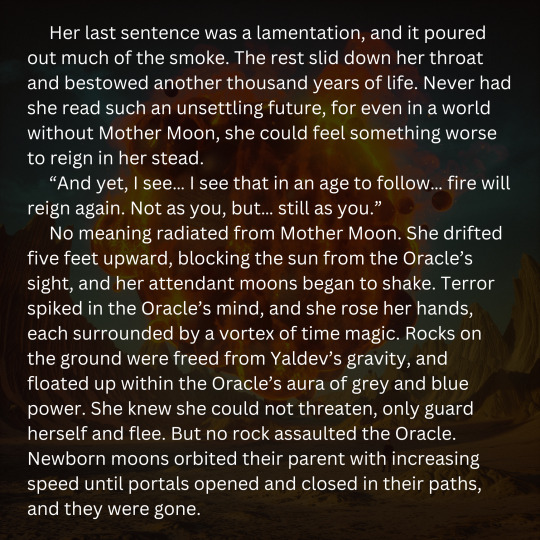
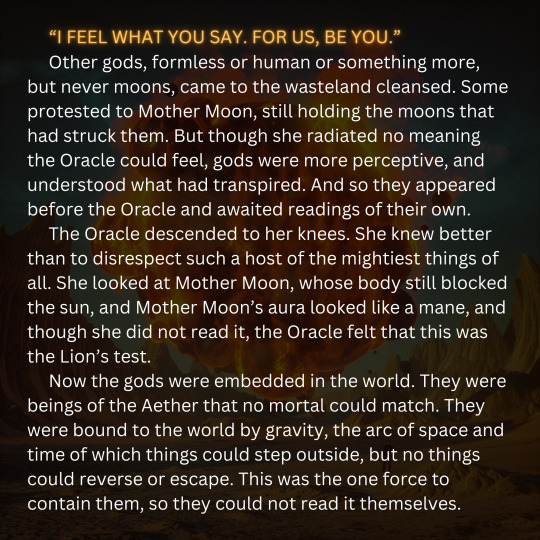
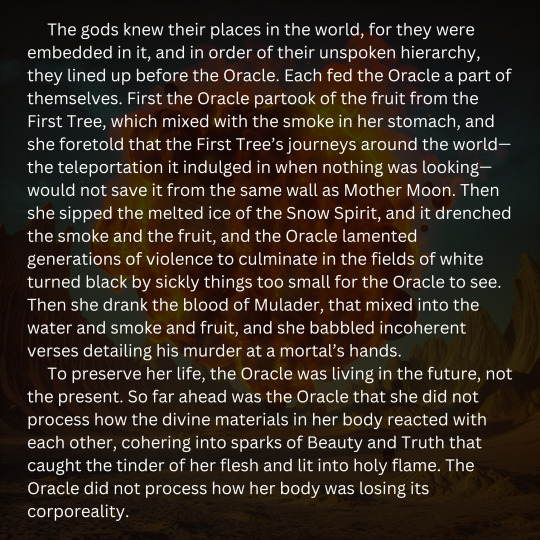
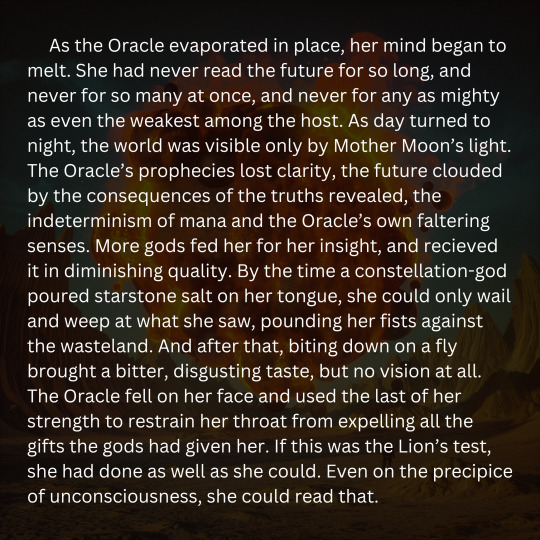
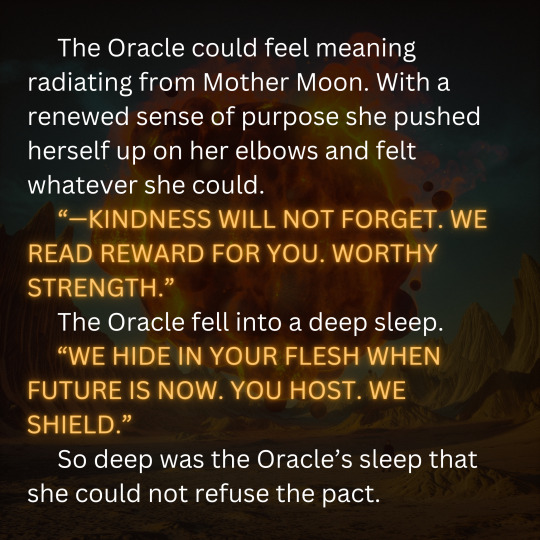
There were animals bigger than she, and there were gods who were stronger, but no sentient thing predated Mother Moon. Even as Yaldev settled into solid form, her magma did not cool. She soared through the heavens she ruled, uncontested even by other gods, stronger gods, for she was Mother Moon. When Mother Moon skimmed close to the surface, holy fire preceded her, fire that returned the land to Yaldev as it once was: lifeless. When she skimmed close to the surface, newborn moons sloughed from her flesh and fell in her wake, born in a wasteland newly cleansed. Mother Moon spared no plant, no beast, no tribe or clan or nation or pack. Witches tried to slow her path by restraining her in space with mystic force, but this was ever in vain. Nothing could stop Mother Moon, nothing but the woman who one day stopped her.
Mother Moon felt the human’s appearance by the shape of its heat signature. How many witches had tried to slow the god’s path by reaching out with invisible force and holding her in space? It was futile—nothing could stop Mother Moon. But this girl had stopped her, and she could feel how: holding her in time. It was the same as space, but it was different, and Mother Moon could make no advance against the indirect approach. So instead she floated down to confront the mortal, in whom the burning god could feel much fear, but no intention to back down.
Mother Moon had no language. She radiated meaning in all directions, and the sapient nearby could not help but understand.
“WHAT ARE YOU.”
“I am called the Oracle.”
“NAME.”
“I am called the Oracle,” said the Oracle, “my brothers were called Hunter, and Picker, and Hunter. My sisters were called Picker and Weaver. My mother was called Weaver, and her mother was called Hunter, and her mother was called Picker. But I am the only oracle, so I am not ‘Oracle,’ but the Oracle.”
This intrigued Mother Moon. She understood what it meant, but not how it could be, for Mother Moon was supreme being. She too could move time, bend it like the Oracle, and she could guess at things to come, but she could not read them like the Oracle.
“FROM WHAT THIS CAME.”
“It is called the Lion.”
This vexed Mother Moon. She understood what it meant, but not how it could be, for there was not one lion as there was one Oracle, but many lions, and no lion could read.
“TRUTH.”
“This is the truth,” said the Oracle, lowering her hands and releasing her temporal grip on the flaming god. “And though you may not believe it, I see that you will.”
More time, that was what counted. Far behind the Oracle, the apocalyptic flames had ceased for a time, and her people were fleeing with all they could before the inevitable began again. Several stones calved from Mother Moon’s body and floated beside her.
“FOR ME, BE YOU.”
Could the Oracle reveal the future to a god? She supposed that if she were not permitted, the Lion would punish her. But if she refused, Mother Moon would punish her, so the Oracle asked for magic from Mother Moon’s body. These were the days when she still needed magic from a body to read its future. So Mother Moon spun, and the wind blew smoke from her flames to the Oracle’s awaiting mouth. She closed her eyes, and some of the divine mist poured from her lips with each word she spoke.
“I see… I see your flame snuffed.”
No meaning radiated from Mother Moon.
“I see no barrier to stop you, but a wall unseen, a wall to douse you as you pass like so much water. I see you known by all sexes and many names, as grass and bird and storm, but… I cannot see fire, and I cannot see Mother Moon! I see only the image of death, and the image of death is you and your children around!”
Her last sentence was a lamentation, and it poured out much of the smoke. The rest slid down her throat and bestowed another thousand years of life. Never had she read such an unsettling future, for even in a world without Mother Moon, she could feel something worse to reign in her stead.
“And yet, I see… I see that in an age to follow… fire will reign again. Not as you, but… still as you.”
No meaning radiated from Mother Moon. She drifted five feet upward, blocking the sun from the Oracle’s sight, and her attendant moons began to shake. Terror spiked in the Oracle’s mind, and she rose her hands, each surrounded by a vortex of time magic. Rocks on the ground were freed from Yaldev’s gravity, and floated up within the Oracle’s aura of grey and blue power. She knew she could not threaten, only guard herself and flee. But no rock assaulted the Oracle. Newborn moons orbited their parent with increasing speed until portals opened and closed in their paths, and they were gone.
“I FEEL WHAT YOU SAY. FOR US, BE YOU.”
Other gods, formless or human or something more, but never moons, came to the wasteland cleansed. Some protested to Mother Moon, still holding the moons that had struck them. But though she radiated no meaning the Oracle could feel, gods were more perceptive, and understood what had transpired. And so they appeared before the Oracle and awaited readings of their own.
The Oracle descended to her knees. She knew better than to disrespect such a host of the mightiest things of all. She looked at Mother Moon, whose body still blocked the sun, and Mother Moon’s aura looked like a mane, and though she did not read it, the Oracle felt that this was the Lion’s test.
Now the gods were embedded in the world. They were beings of the Aether that no mortal could match. They were bound to the world by gravity, the arc of space and time of which things could step outside, but no things could reverse or escape. This was the one force to contain them, so they could not read it themselves.
The gods knew their places in the world, for they were embedded in it, and in order of their unspoken hierarchy, they lined up before the Oracle. Each fed the Oracle a part of themselves. First the Oracle partook of the fruit from the First Tree, which mixed with the smoke in her stomach, and she foretold that the First Tree’s journeys around the world—the teleportation it indulged in when nothing was looking—would not save it from the same wall as Mother Moon. Then she sipped the melted ice of the Snow Spirit, and it drenched the smoke and the fruit, and the Oracle lamented generations of violence to culminate in the fields of white turned black by sickly things too small for the Oracle to see. Then she drank the blood of Mulader, that mixed into the water and smoke and fruit, and she babbled incoherent verses detailing his murder at a mortal’s hands.
To preserve her life, the Oracle was living in the future, not the present. So far ahead was the Oracle that she did not process how the divine materials in her body reacted with each other, cohering into sparks of Beauty and Truth that caught the tinder of her flesh and lit into holy flame. The Oracle did not process how her body was losing its corporeality.
As the Oracle evaporated in place, her mind began to melt. She had never read the future for so long, and never for so many at once, and never for any as mighty as even the weakest among the host. As day turned to night, the world was visible only by Mother Moon’s light. The Oracle’s prophecies lost clarity, the future clouded by the consequences of the truths revealed, the indeterminism of mana and the Oracle’s own faltering senses. More gods fed her for her insight, and recieved it in diminishing quality. By the time a constellation-god poured starstone salt on her tongue, she could only wail and weep at what she saw, pounding her fists against the wasteland. And after that, biting down on a fly brought a bitter, disgusting taste, but no vision at all. The Oracle fell on her face and used the last of her strength to restrain her throat from expelling all the gifts the gods had given her. If this was the Lion’s test, she had done as well as she could. Even on the precipice of unconsciousness, she could read that.
The Oracle could feel meaning radiating from Mother Moon. With a renewed sense of purpose she pushed herself up on her elbows and felt whatever she could.
“—KINDNESS WILL NOT FORGET. WE READ REWARD FOR YOU. WORTHY STRENGTH.”
The Oracle fell into a deep sleep.
“WE HIDE IN YOUR FLESH WHEN FUTURE IS NOW. YOU HOST. WE SHIELD.”
So deep was the Oracle’s sleep that she could not refuse the pact.
———
Yaldev is a sci-fantasy worldbuilding project by Ulysses Maurer, with art by Beeple. By looking at narratives, stylized loredumps, bad poetry and little details, we'll witness the story of a planet filled with magical power, the nation which tried to conquer it, this empire’s dramatic collapse and the new world which emerged in its wake. Along the way we'll meet the characters who live here, and we'll explore questions about nationalism, rationalism, the natural world and the quest to master it. For all stories in chronological order, check out the pinned posts at r/Yaldev!
#beeple#fantasy#scifi#worldbuilding#writing#everyday#short story#surreal#dystopia#dystopian#dystopian fiction#science fiction#science fantasy#sci fantasy#sci-fantasy#scifantasy#sf#sff#worldbuild#worldbuilder#worldbuilders#magic#d&d#dnd#canadian writers#escapism#lore#amwriting
4 notes
·
View notes
Text
Knowing the Inevitable

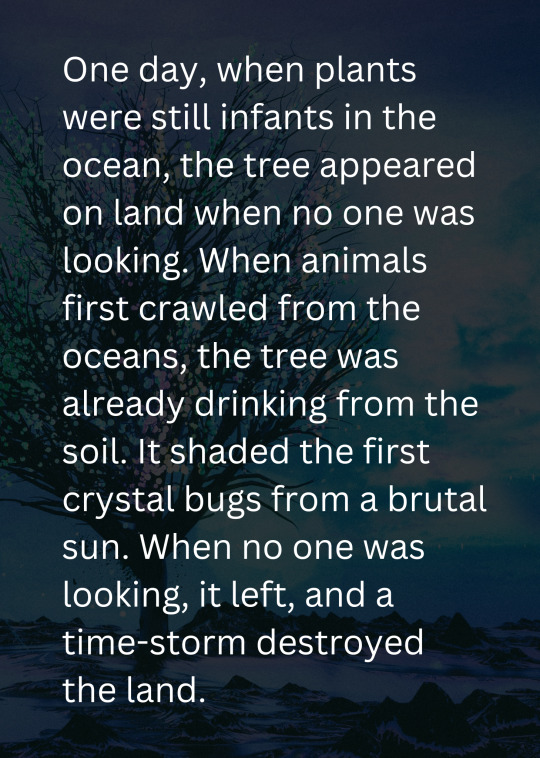
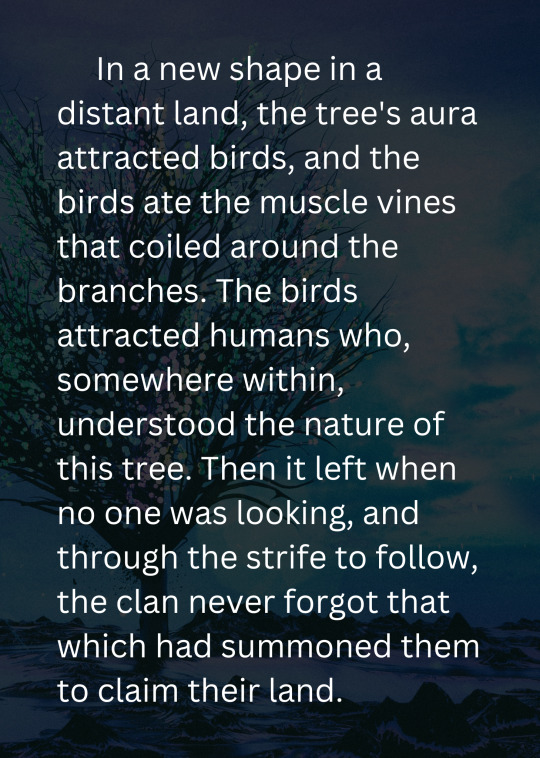
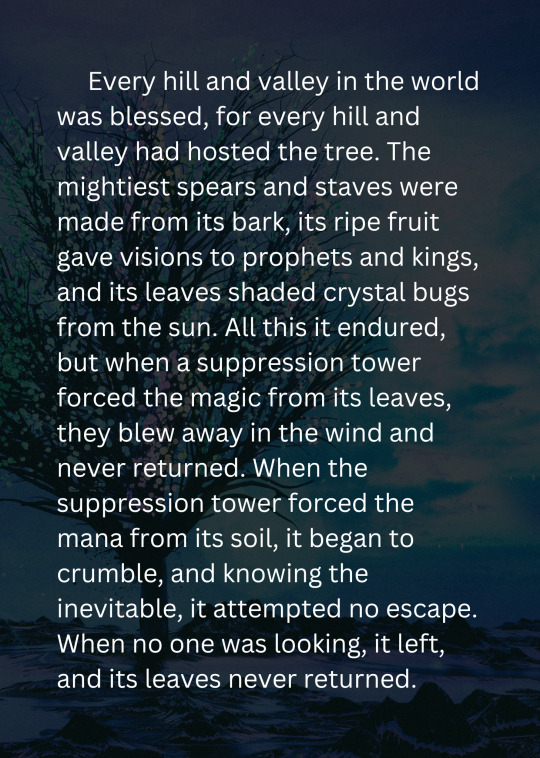
One day, when plants were still infants in the ocean, the tree appeared on land when no one was looking. When animals first crawled from the oceans, the tree was already drinking from the soil. It shaded the first crystal bugs from a brutal sun. When no one was looking, it left, and a time-storm destroyed the land.
In a new shape in a distant land, the tree's aura attracted birds, and the birds ate the muscle vines that coiled around the branches. The birds attracted humans who, somewhere within, understood the nature of this tree. Then it left when no one was looking, and through the strife to follow, the clan never forgot that which had summoned them to claim their land.
Every hill and valley in the world was blessed, for every hill and valley had hosted the tree. The mightiest spears and staves were made from its bark, its ripe fruit gave visions to prophets and kings, and its leaves shaded crystal bugs from the sun. All this it endured, but when a suppression tower forced the magic from its leaves, they blew away in the wind and never returned. When the suppression tower forced the mana from its soil, it began to crumble, and knowing the inevitable, it attempted no escape. When no one was looking, it left, and its leaves never returned.
———
Yaldev is a sci-fantasy worldbuilding project by Ulysses Maurer, with art by Beeple. By looking at narratives, stylized loredumps, bad poetry and little details, we'll witness the story of a planet filled with magical power, the nation which tried to conquer it, this empire’s dramatic collapse and the new world which emerged in its wake. Along the way we'll meet the characters who live here, and we'll explore questions about nationalism, rationalism, the natural world and the quest to master it. For all stories in chronological order, check out the pinned posts at r/Yaldev!
#beeple#fantasy#scifi#worldbuilding#writing#everyday#short story#surreal#dystopia#dystopian#dystopian fiction#science fiction#science fantasy#sci fantasy#sci-fantasy#scifantasy#sf#sff#worldbuild#worldbuilder#worldbuilders#magic#d&d#dnd#canadian writers#escapism#lore#amwriting
2 notes
·
View notes
Text
Undead

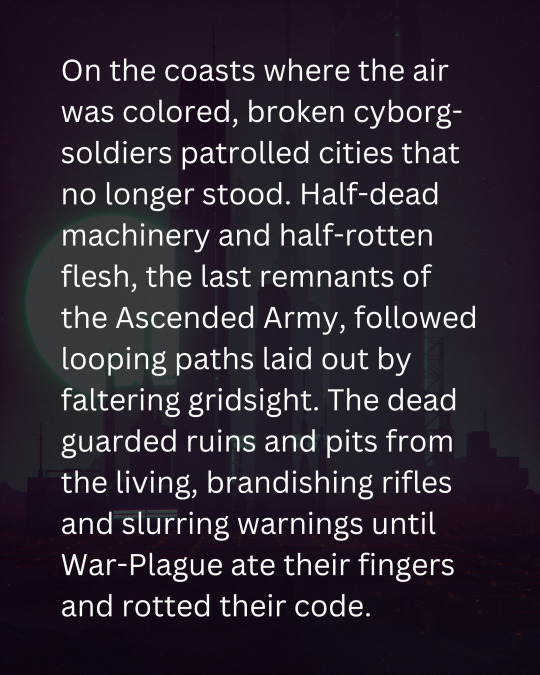
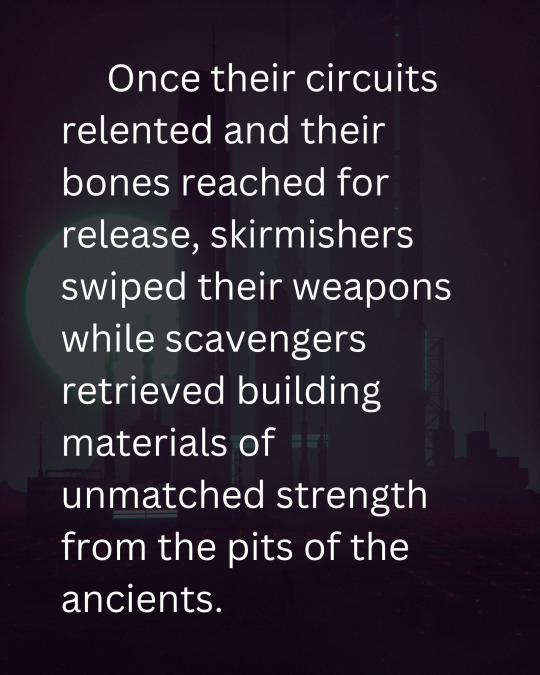
On the coasts where the air was colored, broken cyborg-soldiers patrolled cities that no longer stood. Half-dead machinery and half-rotten flesh, the last remnants of the Ascended Army, followed looping paths laid out by faltering gridsight. The dead guarded ruins and pits from the living, brandishing rifles and slurring warnings until War-Plague ate their fingers and rotted their code.
Once their circuits relented and their bones reached for release, skirmishers swiped their weapons while scavengers retrieved building materials of unmatched strength from the pits of the ancients.
———
Yaldev is a sci-fantasy worldbuilding project by Ulysses Maurer, with art by Beeple. By looking at narratives, stylized loredumps, bad poetry and little details, we'll witness the story of a planet filled with magical power, the nation which tried to conquer it, this empire’s dramatic collapse and the new world which emerged in its wake. Along the way we'll meet the characters who live here, and we'll explore questions about nationalism, rationalism, the natural world and the quest to master it. For all stories in chronological order, check out the pinned posts at r/Yaldev!
#beeple#fantasy#scifi#worldbuilding#writing#everyday#short story#surreal#dystopia#dystopian#dystopian fiction#science fiction#science fantasy#sci fantasy#sci-fantasy#scifantasy#sf#sff#worldbuild#worldbuilder#worldbuilders#magic#d&d#dnd#canadian writers#escapism#lore#amwriting
1 note
·
View note
Text
October Update! Links under the image.

Patreon link!
This is completely optional. It's just a way for you to get some extra goodies while supporting my journey toward creative independence, so I can make more things for you.
Discord link!
The ideal is to build a community of Yaldev enjoyers who can chat about the project and their hobbies, with secondary function as a general chatting space. I want it to be at least pseudo-intellectual, so don't shitpost too hard (or keep it to appropriate channels).
0 notes
Text
Strange City

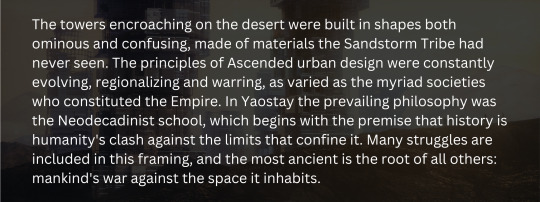


The towers encroaching on the desert were built in shapes both ominous and confusing, made of materials the Sandstorm Tribe had never seen. The principles of Ascended urban design were constantly evolving, regionalizing and warring, as varied as the myriad societies who constituted the Empire. In Yaostay the prevailing philosophy was the Neodecadinist school*,* which begins with the premise that history is humanity's clash against the limits that confine it. Many struggles are included in this framing, and the most ancient is the root of all others: mankind's war against the space it inhabits.
Our creations are an articulate scream of agency, rejecting the notion that how things are is how they must be. Architecture, therefore, should display the sublimity of human brilliance and celebrate our triumph over nature. Neodecadinism expresses this through structures which look impractical or even impossible, made real through mathematical precision and physical technicalities. Its buildings are often asymmetric and tall, with strange construction processes and obscure centers of balance—it's as though the whole city should topple.
The hunters knew none of this. The Sandstorm language didn't have the phonemes to pronounce "Neodecadinist." In this city they saw an unknown force that built without regard for the possible. Divine or demonic, they could not face it unprepared. When the hunters returned, preparations for an offensive began. The war that followed was a slaughter, an Ascended shout of Neodecadinist triumph over its land and all that lived there.
———
Yaldev is a sci-fantasy worldbuilding project by Ulysses Maurer, with art by Beeple. By looking at narratives, stylized loredumps, bad poetry and little details, we'll witness the story of a planet filled with magical power, the nation which tried to conquer it, this empire’s dramatic collapse and the new world which emerged in its wake. Along the way we'll meet the characters who live here, and we'll explore questions about nationalism, rationalism, the natural world and the quest to master it. For all stories in chronological order, check out the pinned posts at r/Yaldev!
#beeple#fantasy#scifi#worldbuilding#writing#everyday#short story#surreal#dystopia#dystopian#dystopian fiction#science fiction#science fantasy#sci fantasy#sci-fantasy#scifantasy#sf#sff#worldbuild#worldbuilder#worldbuilders#magic#d&d#dnd#canadian writers#escapism#lore#amwriting
4 notes
·
View notes
